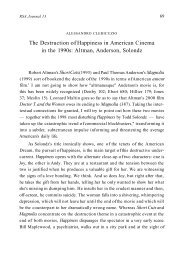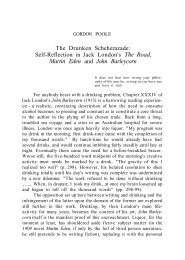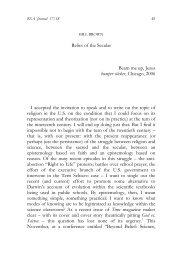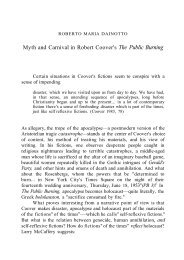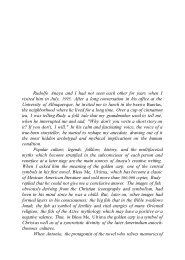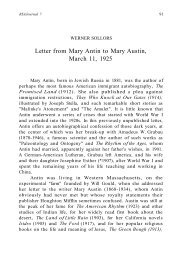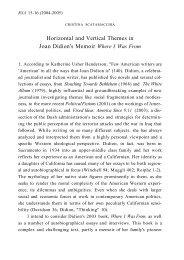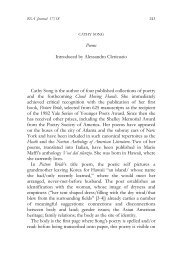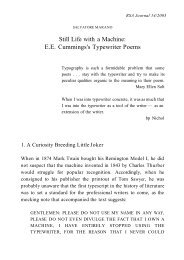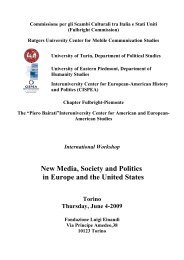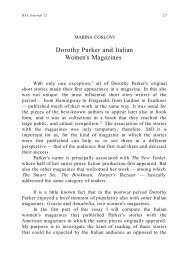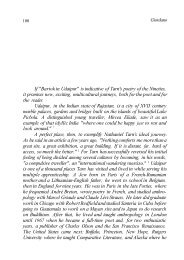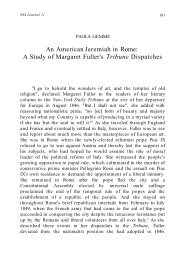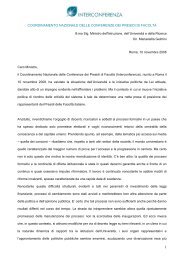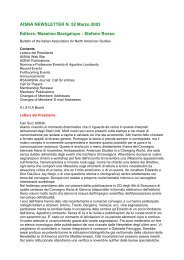AISNA NEWSLETTER N. 50 April 2002 Editors: Massimo Bacigalupo
AISNA NEWSLETTER N. 50 April 2002 Editors: Massimo Bacigalupo
AISNA NEWSLETTER N. 50 April 2002 Editors: Massimo Bacigalupo
You also want an ePaper? Increase the reach of your titles
YUMPU automatically turns print PDFs into web optimized ePapers that Google loves.
<strong>AISNA</strong> <strong>NEWSLETTER</strong> N. <strong>50</strong> <strong>April</strong> <strong>2002</strong><br />
<strong>Editors</strong>: <strong>Massimo</strong> <strong>Bacigalupo</strong> - Stefano Rosso<br />
Bulletin of the Italian Association for North American Studies<br />
Contents<br />
<strong>AISNA</strong> Biennial Conference 2001<br />
Workshop Reports<br />
American Studies in Italy-the Genoa panel<br />
Bordeaux Eaas Conference Report<br />
<strong>AISNA</strong> Web Site<br />
The Plight of Americanists<br />
Recent Events<br />
Forthcoming Events<br />
Announcements<br />
Call for Papers<br />
Letters<br />
Membership Renewal<br />
Members' Publications<br />
New Members<br />
New Members' Addresses<br />
Changes of Members' Addresses<br />
A.I.S.N.A Board<br />
The <strong>AISNA</strong> Biennial Conference "America & the Mediterranean" was held in Genoa,<br />
November 8-11, 2001.<br />
It was opened by Rosella Mamoli Zorzi ("Genoa: Gateway to the Mediterranean") and Ronald<br />
Steel ("America's Mediterranean Coast") in Palazzo San Giorgio, the medieval building of the<br />
Genoa Port Authority, and continued in the newly restored Palazzo Ducale. There were<br />
thirteen workshops, from "American Poetry and the Mediterranean Heritage" to " 'Wars they<br />
Have Seen': Americans in Mediterranean Conflicts." Christopher Irmscher gave a plenary<br />
lecture on "Mediterranean Metamorphoses," largely concerned with Longfellow's Italian<br />
ventures, and Fred Moramarco delivered a plenary lecture on "American Views of the<br />
Mediterranean and Its People." In a newspaper article about the conference (Italy Daily,<br />
International Herald Tribune, 12-7-01) Moramarco claimed that the United States usually has<br />
been considered in an Atlantic, northern-European perspective and that the Genoa<br />
Conference broke new ground in revising this view and showing just how Mediterranean<br />
America is, from its origins up to the present day. A final panel offered a medievalist's view of<br />
the (Mediterranean) birth of the so-called American individualism (Gabriella Airaldi) and an<br />
account of views of America produced in Italy to encourage emigration (Francesco Surdich),<br />
while poet Robert Hahn (author of No Messages, University of Notre Dame Press), spoke of<br />
the Mediterranean in American poetry and read a recently completed poem, "Chiaroscuro"-a<br />
view of Venice from the unusual vantage point of a beach in Portorico. The Conference<br />
Proceedings are being collected by <strong>Massimo</strong> <strong>Bacigalupo</strong> for publication in book and/or<br />
electronic form. (<strong>Massimo</strong> <strong>Bacigalupo</strong>)<br />
Workshop Reports<br />
The following reports have been received from Workshop Coordinators.<br />
#1 American Poetry and the Mediterranean Heritage<br />
Coordinators: Gianfranca Balestra (U. Siena), Paola Loreto (U. Statale Milano)<br />
The workshop was entirely dedicated to American poetry and its relationship to Mediterranean<br />
cultures, including various possible responses to their literary and artistic heritage, and
comparisons of world views across the ocean. Earl Martin Pedersen illustrated an instance of<br />
the continuation in American poetry of the Hellenistic ideal of unity of body and mind in<br />
physical health as it is preserved through sport activities, among which baseball is the most<br />
typically American. Nicola Gardini explored the relevance of Virgil's Aeneid to the development<br />
of Robert Lowell's poetic work and persona, particularly in such central issues as the relation<br />
between power and creation, tradition and the individual talent. Gregory Dowling analyzed<br />
Herman Melville's Clarel, which, with its grim desert setting, has sometimes been considered a<br />
kind of long-winded precursor to The Waste Land. By focusing on certain epiphanic moments<br />
which provide fleeting but important relief, Dowling attempted to demonstrate that the poem<br />
has far greater variety of mood and tone than it is often given credit for. Paola Nardi examined<br />
Marianne Moore's allusions to ancient Egypt, particularly those referring to animals, as part of<br />
the poet's on-going concern with the relation between culture and nature. Antonella Francini's<br />
paper was a study of the network of European influences on the poetry of Charles Wright,<br />
ranging from Catullus through Dante to Leopardi, with a particular emphasis on the figure of<br />
Orpheus. In "'The Problem' of the Priest,'" Giuseppe Nori explored Emerson's problem of<br />
vocation. Recalling the re-orienting experience of Emerson's first trip to Europe (1832-33), Nori<br />
maintained that the impact of his first, direct confrontation with Mediterranean art and culture<br />
contributed to his decision to become a poet as much as it shaped his most characteristic<br />
strategies of cultural "equalization" which we can see at work in both his essays and his poems<br />
of the 1840's. Maria Proitsaki sent a paper to be read on the African American poet Rita<br />
Dove's feminist revision of a Greek legend in her "Nestor's Bathtub", in which she reintroduced<br />
the concrete presence of a long-forgotten queen. Gianfranca Balestra examined Poe's<br />
appropriation of the landscapes and cultures of the Mediterranean area through books and the<br />
imagination, focusing on his use of the classical world in three poems ("To Helen", "The<br />
Coliseum" and "To Zante") as part of his quest for ideal beauty as well as his personal version<br />
of romantic exoticism. Finally, Paola Loreto retraced the origin of Derek Walcott's esthetic of<br />
light as it is elaborated in his last poem, Tiepolo's Hound, in the Thomistic sources of Dante<br />
Alighieri's world conception. The variety of texts examined, the participants' concern with<br />
contemporary theoretical and cultural debate, and the lively discussion that ensued, all<br />
contributed to a useful assessment of the centrality of the Mediterranean heritage for American<br />
poetry.<br />
#2 The Mediterranean in Italian American Culture<br />
Coordinator: John Paul Russo (Univ.of Miami)<br />
The panel on "The Mediterranean in Italian American Literature and Culture," which continued<br />
the theme taken up at the <strong>AISNA</strong> conference in Siracusa, consisted of six papers exploring a<br />
variety of topics from gender, feminist themes, and the mattanza, to non-fiction film,<br />
contemporary American fiction, and the strange "silence" of the sea in emigration literature.<br />
From an ongoing project Prof. Federico Siniscalco examined half a dozen film interviews of<br />
young Italian Americans studying in Tuscany and coming to terms, intelligently and sensitively,<br />
with ethnicity and identity. Live video presentations that enabled the participants to express<br />
themselves was one of the highlights of the morning session. What became abundantly clear<br />
in the general question-and-answer periods was the inability to arrive at univocal meanings of<br />
the Mediterranean: "The sea has many voices." Panelists included Suzanne Branciforte, U.<br />
Siena, "Viaggio al centro della terra madre: riflessioni sull'identita' italo americana"; Daniela<br />
Daniele, U. Udine, "Mediterranean Clippings: Mary Caponegro's 'Tombola'"; Martino Marazzi,<br />
Columbia U., "L'umbarco: Il silenzio del Mediterraneo negli scritti d'emigrazione"; Elisabetta<br />
Marino, U. Roma II, "The Mediterranean Sea: Memory and Tradition in two Italian American<br />
Writers"; Federico Siniscalco, U. Siena at Arezzo, "The Mediterranean in Italian-American<br />
Non-Fiction Film"; and John Paul Russo, U. of Miami. Fla., "The Mediterranean Theme in<br />
DeLillo's 'Underworld.'"<br />
#3 Mediterrenean Religiosity in the United States: Migrating Religions and their<br />
Encounters with Other Religions and Cultures.<br />
Coordinators: Maria Susanna Garroni (I.U.O. Napoli), Elisabetta Vezzosi (U. Trieste).<br />
The workshop has focused on issues that emerged when religious cultures and feelings,
practices, beliefs, hierachical structures and institutional organizations that had stemmed from<br />
the Mediterrenean environment were carried by immigrants to the United States. The papers<br />
by Matteo Sanfilippo, Ellen Ginzburg, Maria Susanna Garroni, Cristina Mattiello and Elisabetta<br />
Vezzosi highlighted on the one hand the preoccupations toward new religiosities expressed by<br />
the host society, and on the other the types of resistance and adjustments to the new<br />
environment that these Mediterrenean religious cultures were able to elaborate. The United<br />
States ruling-class culture felt "invaded", threated and also ominously seduced, as the paper of<br />
Bonomo manifested, by this diversity. It worried that it may spread and dilute, contaminate, its<br />
own religious beliefs. Whereas those differing religious worlds -- Ginzburg Migliorino showed<br />
that within the same religious denominations class and national cultures determined different<br />
levels of adaptation -- had to redefine part of their previous lore in order to live in the new<br />
environment and to compete with the well entrenched and already established religious<br />
cultures. In the process those Mediterrenen religious cultures profited of the specific sociopolitical<br />
world of the United States to develope new power structures and gender relations, as<br />
Vezzosi, Mattiello and Garroni contended. But they also enriched their homeland by filtering<br />
back at least part of their "american" experience, as Sanfilippo and Garroni have shown.<br />
Leonardo Bonomo has examined the multifaceted character and intellectual role of<br />
anticatholicism in American culture, digging into the private and public writings of relevant<br />
authors such as Ralph Waldo Emerson, Margaret Fuller and Lydia Maria Child, and into the<br />
lesser literature of sensationalist publications. Stephen Perrin has offered a new reading of Jim<br />
Carroll poetical production, showing how his catholic upbringing and spiritual underpinning<br />
provided an underlining frame of reference for his inspiration and a different version of<br />
American catholicism. Panelists: Matteo Sanfilippo, Università della Tuscia, "L'attenzione della<br />
Santa Sede all'emigrazione italiana negli Stati Uniti"; Elisabetta Vezzosi, Università di Trieste -<br />
"Cittadine e mediatrici etniche: le suore italiane negli Stati Uniti"; Maria Susanna Garroni,<br />
Istituto Orientale di Napoli - "Immigrant women religious: a splintered ethnic and spiritual<br />
identity"; Cristina Mattiello, Roma - " Le Salesiane tra identità etnica e americanizzazione";<br />
Leonardo Buonomo, Università di Trieste, "The Indiscreet Charm of Popery: The Catholicism<br />
in Nineteenth Century American Literature"; Ellen Ginzburg, Università di Trieste, "Italian Jews<br />
in the United States in the early 1940's: Individual impressions and life-style changes";<br />
Stephen Perrin, University of Liverpool, "I got every sacrament behind me": Jim Carroll and the<br />
inescapable history of American Catholicism.<br />
#4 The Vision of the Mediterranean in Contemporary U.S. fiction: From the Cradle to the<br />
Zone<br />
Coordinator: Luca Briasco (U. Roma 1)<br />
The workshop's main purpose was tracking and following some of the itineraries in the U.S.<br />
contemporary novel that have been progressively redefining the role of the Mediterranean in<br />
the American fiction writer's agenda and sensibility. These itineraries, in such seminal works<br />
as William Gaddis's The Recognitions, Joseph Heller's Catch 22 and Thomas Pynchon's V<br />
(analyzed by Mattia Carratello, Umberto Rossi and Giuseppe Costigliola), gradually lead the<br />
reader away from the escapist perspective that prevailed in the Modernist expatriates'<br />
experience, towards a complex geopolitical vision of the Mediterranean as the laboratory of a<br />
possible, non-American century. Our workshop concentrated more specifically on William<br />
Burroughs's fiction and on his vision of the Mediterranean as a zone much more than a cradle<br />
(Paolo Prezzavento, Laura Salvini, Roberta Fornari), analyzing its political, mythical and<br />
imaginative impact on contemporary genre writers such as cyperpunk leader Bruce Sterling<br />
(Luca Briasco).<br />
#5 American Writers and the Mediterranean: A Comparison of Viewpoints<br />
Coordinator: Marina Coslovi (U. Venezia)<br />
The papers presented in this workshop showed how difficult it has been for American authors<br />
writing on the Mediterranean to articulate a personal response to an area so saturated with<br />
previous representations, and also how this situation has affected and often prejudiced their<br />
encounter with native cultures.<br />
In her paper on Royall Tyler's The Algerine Captive, Sarah Wood (Univ. College London)
argued that in this novel, best known for its patriotic claims and often dismissed as a derivative<br />
travelogue, Tyler subtly challenged contemporary American and European views of the<br />
Barbary State and its Islamic Culture. Barbara Nugnes (U. Pisa), who delivered her paper in<br />
print form due to illness, examined Washington Irving's Tales of the Alhambra. Her paper<br />
shows how in this book Irving created a mythical geography by using reality only to confirm his<br />
preconceived, literary image of the country.<br />
Shirley Foster (U. Sheffield) talked about 19th century American views of Naples. She focused<br />
on four representative writers (James Fenimore Cooper, Maria Sedgwick, Mark Twain and<br />
Henry James) and explored the different ways in which they endeavored to find the 'true<br />
meaning' of Italy.<br />
Sirpa Selenius (U. Joensuu, Finland) devoted her paper to Nathaniel Hawthorne's four-month<br />
stay in Florence in 1858. She pointed out that, although Hawthorne did not do anything to<br />
distinguish himself from the ordinary mid-nineteenth century tourist, his Florentine sojourn was<br />
an important moment in his life.<br />
Daniela F. Virdis (U. Genoa) examined Wallace Stevens' "Reply to Papini." She showed how<br />
the Italian writer's ideas on poetry were used by Stevens to elucidate, by contrast, his own<br />
view of the role of the poet in society.<br />
Marina Coslovi (U. Venice) explored the meaning of Baedeker's tourist world in Thomas<br />
Pynchon's V., a novel in which tourists are no longer looking for the 'reality' of the<br />
Mediterranean, for they live and move in a custom-made, self sufficient system whose very<br />
existence implies a divide between them and native cultures. Nevertheless a 'real'<br />
Mediterranen, which is presented as a kind of antidote to Baedeker's world, does emerge from<br />
the novel.<br />
#6 Emerson at (Nearly) 200: His Legacy from a Transatlantic Perspective<br />
Coordinators: Giorgio Mariani (U. Rome 1) - Igina Tattoni (U. Rome 1) (Project Emerson 2003)<br />
Emerson at (nearly) 200: the (mis)fortune of Emerson in Italy", coordinated by Igina Tattoni<br />
and Giorgio Mariani (both from the U. Rome 1), was a workshop not related to the main theme<br />
of the Genoa conference. It started off with introductory statements by the coordinators, who<br />
stressed both the paradoxical nature of Emerson's Italian reputation (known to everyone,<br />
studied in some depth by only a handful) and the importance of the revival of Emerson and<br />
Emersonian studies that has been under way in the United States over the last two decades.<br />
Along these lines, in her paper Anna Scannavini (U. L'Aquila) analyzed some aspects of<br />
Stanley Cavell's approach to Emerson, especially in terms of language, suggesting also how<br />
some of Cavell's insights may be useful to a study of Italian translations of Emerson. Then<br />
Carlo Martinez (U. Pescara) investigated some of the ways in which R. W. Emerson might<br />
have represented an intellectual and a formal model Henry James had to confront in writing his<br />
critical works, especially the Prefaces to the New York Edition. Martinez argued that Emerson<br />
represented a crucial model for James, not only as regards his critical writings, but also in<br />
terms of the role he bestowed on the critic in the social and cultural field. Unfortunately, Sonia<br />
di Loreto (Rutgers University) could not be present to read her paper, " 'To Begin the World<br />
Anew': Labor and the Body in Emerson's 'Man the Reformer' ." The discussion following the<br />
papers was concise but lively, with comments by Mario Corona, Elèna Mortara, Cristina<br />
Giorcelli, and others, focussing on the issue of Emerson's modernity and his relevance to both<br />
American and Italian contemporary culture. Finally, the workshop gave the organizers a<br />
chance to present the Emerson 2003 International Conference which the English Dept. of "La<br />
Sapienza", along with the Centro Studi Americani in Rome, will be organizing in the fall of that<br />
year to mark the Emerson bicentennial.<br />
#7 Genoa and the United States in the 19th and 20th Century<br />
Coordinator: Valeria Gennaro Lerda (U. Genova)<br />
The workshop opened with papers given by P. Castagneto and L. Codignola. Castagneto<br />
explained that news of colonial American history and the revolution reached Genoa through<br />
the diplomatic correspondence of Genoese diplomats in London; Codignola illustrated how an<br />
American consulate was established in Genoa at the end of the 18th century. S. Delfino spoke<br />
of the U.S. presence in the Mediterranean from the early 19th centuy and of the political and
economic strategies of the period. Finally, N. Clerici examined the image of the American<br />
Indian in the Genoese press in the late 19th century.<br />
#8 "Sensitive as Any Woman": Nineteenth-Century American Women and Mediterranean<br />
Masculinities<br />
Coordinator: Anna Scacchi (U. Padova)<br />
The aim of this workshop was to include gender as a tool of analysis in Said's notion of<br />
Orientalism, complicating his often dychotomic description of the intercourse between the East<br />
and the West. Said's characterization of Orientalism as a male discourse disciplinating<br />
Western relations with the Orient largely overlooks the presence of women as participants in<br />
the production of discourses about the East. American women's accounts of the<br />
Mediterranean, however, are often highly complex texts, simultaneously articulating the<br />
dominant discourse of Western hegemony and offering a critique of the gender hierarchies it<br />
produced. American women's Orientalism could not rely easily on the configuration of the<br />
Western encounter with the East as a heterosexual romance between a white domineering<br />
man and a dark submitted woman. When they did, they would have to resort to cross-dressing,<br />
a kind of transvestitism which undermines Said's heterosexual assumptions. Often, they would<br />
mantain power relations while inverting genders. The representation of Mediterranean<br />
masculinities in nineteenth-century American women's fiction often portrayed Southern<br />
European and Northern African men as endowed with a non-conventional masculinity which<br />
enabled a deeper emotional contact opening the way to contradictory feelings, and even<br />
fantasies of mastery and control and role-reversals. Imagining non-conventional masculinities<br />
located in the Mediterranean provided a terrain to revise and critique Victorian gender<br />
prescriptions and the definition of Anglo-Saxon middle-class masculinity. Projecting the loving<br />
intimacy of their relationships with other women onto heterosexual couples where the male<br />
partner was a "dark" man, American women writers questioned the American marriage<br />
institution and the hierarchical gender relations structuring society in the US. As Sara Antonelli<br />
(Università di Roma 3 and Centro Studi Americani), who had a paper on Mediterranean<br />
masculinities in Louisa May Alcott's writings, was not able to attend, only four papers were<br />
presented. Patricia Thompson Rizzo (U. Padova) explored Emily Dickinson's rewriting of the<br />
romance of Anthony and Cleopatra, where she casts herself in the role of the Roman hero<br />
while dressing Susan's excessive personality in the Egyptian queen's seducing garments.<br />
Anna Scacchi (U. Padova) analyzed Harriet Beecher Stowe's international novel set in<br />
fifteenth-century Italy, Agnes of Sorrento, as a rewriting of Uncle Tom's Cabin's "intersecting<br />
rhetorics of abolition and feminism" (Sanchez-Eppler) at the beginning of the Civil War. Tatiana<br />
Petrovich Njegosh (U. Macerata) examined Henry James's revision of his father's and<br />
brothers' normative masculinity via the allure of Italian male bodies combining openness and<br />
control, ranging from Angelo Beati ("Adina") to the actor Tommaso Salvini. Paula Rabinowitz<br />
(U. Minnesota) was not able to attend. Her paper "Meeting on the Corner: Mediterranean Men<br />
and Urban American Women," which explored the legacy of nineteenth-century attractions<br />
between American women writers and Mediterranean men by focusing on their early modern<br />
offspring, and offered a reading of September 11th's attack on the Twin Towers as<br />
literalizing/reversing the deadly lure drawing Daisy Miller to the ruins of imperial Rome, was<br />
read by Patty Thompson Rizzo.<br />
#9 The Mediterranean Education of American Artists<br />
Coordinator: Maria Vittoria D'Amico (U. Catania)<br />
The thematic framework that had been designed for this workshop was only partially explored.<br />
The tragic events of 11 September 2001 prevented Edy Giunta (NJCU) and Roberto Maria<br />
Dainotto (Duke University) from attending, thus depriving us of contributions on the presence<br />
of classical mythology in the works of Italo-American women writers (Giunta) and on the poetic<br />
works of United States soldiers stationed in the Mediterranean during the Second World War<br />
(Dainotto).<br />
Initally the hypothesis was that discussion of the Mediterranean and its cultural topoi might<br />
constitute for American intellectuals and travellers something more and something different<br />
from the experience of travel, real or imaginary, carried out on a far-flung leg of the Grand
Tour. For some of these artists this had meant entering into Mediterranean dimensions that<br />
took them back to a magic meeting with the origins or, again, to other imaginary panoramas,<br />
remote or internal, as Salvatore Marano demonstrated in his presentation, "Beneath Crooked<br />
Rainbow: Amy Lowell's Education of the Eye." Considering the geopolitical and aesthetic<br />
aspects of Lowell's poetry in Cangrande's Castle, Marano gave full treatment to her unique<br />
effort in conjugating formal experiment with political engagement; demonstrating furthermore<br />
how Amy Lowell envisaged the Mediterranean not so much as the Southern double of<br />
continental Europe as the gateway to the Near and, by extension, to the Far East. The other<br />
papers in the workshop emphasized how Mediterranean culture has a role as tolerant and<br />
generous educator offering new arrivals not only knowledge of its own past, but also the<br />
possibility of creating a fruitful contamination with the culture of origin. Indeed, this process of<br />
generative contamination was one of D'Amico's reading keys for Paul Bowles's 'Moroccan<br />
works'. In D'Amico's perspective ("In the Midst of the Absolute: Paul Bowles's Moroccan<br />
Novels"), this writer and musician effortlessly adopted the Weltaschauung of his new North<br />
African context, while still remaining anchored to some literary models from his American<br />
upbringing as well as to some humours and constructions characteristic of New England<br />
mentality. To some extent this is a form of elitist attitude that Kurt Mayer highlighted very well<br />
in his presentation, "Henry Adam's First Sojourns in Italy, 1859/60", which was read as a<br />
journey towards the discovery of Italy and the process at the core of the movement for national<br />
unification, on the part of "a young man of the world" who "sees the native population as if<br />
through the reverse side of binoculars." Constructed through a rigorous analysis of Adams'<br />
letters and other texts, Mayer's paper demonstrated how Adams himself, "detached observer<br />
aware of his own provenance from a superior cultural tradition", was perfectly aware "of what<br />
sets him apart - his own national identity."<br />
#10 Mediterranean Mediations: Transatlantic Imaginary and Gender Identity<br />
Coordinators: Liana Borghi (U. Firenze), Cristina Scatamacchia (U. Perugia)<br />
In Joseph Pulitzer's America, Nelly Bly's bet that she would beat Phileas Fogg and tour the<br />
world in less than 80 days may offer further proof that by the end of the nineteenth century the<br />
globe was already shrinking under pressure from the new technologies, and that concepts of<br />
globalization were already present in economic and cultural fields. And we may agree with<br />
Ioanna Laliotou that the world had become the central cultural representation, whereas Europe<br />
and America by that time merely represented two poles of contemporary imagination:<br />
exoticism and exceptionalism. In this framework, the unaccompanied American woman<br />
traveller of those years, on account of her "singular anomaly," assumed a double role: she was<br />
exceptional in that she was independent (in all possible economic and existential implications),<br />
and she was exotic in that she was gendered female according to Mediterranean stereotypes<br />
recorded in the sacred texts of the Judeo-Christian tradition. The inner and outer negotiation of<br />
this condition seems to be a recurring theme in many different narratives. Within the<br />
ethnographic scheme governed by the tropes of identity and difference, naturalization and denaturalization<br />
(also discussed by Laliotou), transatlantic travellers face experiences which<br />
require the deconstruction of those same tropes. Consequently, their travel narratives are both<br />
authoritative and "ambi"-valent. Being neither wholly positive nor wholly negative, neither<br />
deconstructive nor affirmative, mixing memory and desire, they appear historically bereft and<br />
liminal. They reveal (in a freely Derridean reasoning mode) that their authors are constructing<br />
for themselves "different" identities based on a critical vigilance which does not cast off<br />
traditional and patriarchal values and patterns, but rather subverts and perverts them, denaturalizing<br />
them in subjective fashion. If this observation applies to narratives written by<br />
American women travelling in the Mediterranean area, it may be worthwhile to inquire whether<br />
it also applies to Mediterranean women describing their sojourn in the United States. What do<br />
they have in common, Nellie Bly's story, Royal Tyler's tale of the Algerine captive, Ruth<br />
Benedict's anthropology, or the travel writings of some 19th century women writers? This<br />
question set the focus for our workshop, highlighting the political connection between identity,<br />
narration and space in travel writing. Papers: Liana Borghi, "Crittografie spaziali di Grace<br />
Greenwood, Marion Harland, Marietta Holley, Maud Elliott."Algerina Neri, "Royal Tyler's The<br />
Algerine Captive and the sympathetic woman reader." Cristina Scatamacchia, "Dal grand tour
al tour du monde: Nellie Bly e la metamorfosi del viaggio a femminile fine Ottocento."<br />
Alessandra Lorini, "Ruth Benedict e l'identità di genere tra apollineo e dionisiaco."<br />
#11 The Sea and Revolution: The Mediterranean, the Early Republican Age, and U.S.<br />
Culture<br />
Coordinators: Salvatore Proietti (U. Roma 1), Igina Tattoni (U. Roma 1)<br />
The workshop has explored the connections between Mediterranean histories and cultures<br />
and the post-Revolutionary age, addressing also later texts choosing this connection as a tool<br />
for reassessing the usability of the national past and the (in)stability of the self-image of<br />
"America." In an interdisciplinary vein, our contributors delivered analyses of both literary and<br />
historical writings. Among literary studies were Salvatore Proietti's "Sailing Across the Color<br />
Line: On Royall Tyler's The Algerine Captive," Cinzia Schiavini's "From the Edges of<br />
Revolution to the Shores of Modernity: Melville and the Mediterranean", and Igina Tattoni's<br />
"'There Is No Room for Hesitation: The Uses of Time in Charles Brockden Brown's Arthur<br />
Mervyn"; also, we read a short communication by Alessandro Portelli on "The Mediterranean<br />
as Middle Ground in the Autobiography of Olaudah Equiano." Among historical analyses were<br />
Marco Sioli's "Liberty and Nature: Joel Barlow's Diplomatic Mission to Algiers," and Richard<br />
Samuelson's (who could not attend the conference) "John Quincy Adams's Lost History of the<br />
Russo-Turkish War: Greek Independence and the Limits of the American Empire."<br />
#12 The U.S. Middle Eastern Policy in the 20th Century: Aspects and Problems.<br />
Coordinator: Antonio Donno (U. Lecce)<br />
The workshop on "The U.S. Middle Eastern Policy in the 20th Century: Aspects and Problems"<br />
was given by some scholars in the U. Lecce (chaired by professor Antonio Donno), who for<br />
many years have studied and written on the U.S. policy in the Middle East. Thus, the workshop<br />
has been a synthetic and partial presentation of their research results. Antonio Donno has<br />
given a balance of the beginnings of the American commitment in the Middle East until the<br />
Second World War; Daniele De Luca has presented a paper on the U.S. strategic and military<br />
policy from Truman to Nixon, when the U.S. commitment towards the Middle East questions<br />
was global and more and more intensive; Paola Olimpo has presented a paper on the role of<br />
the U.S. Congress in the making of the American Middle Eastern policy from Truman to<br />
Johnson, pointing out the importance of the American domestic issues on the policymakers<br />
dealing with the Middle East crisis; Valentina Vantaggio has discussed a crucial problem in the<br />
history and in the geopolitics of the Middle East: the oil and the U.S. policy towards this issue<br />
from the Twenties to the Suez crisis. Finally, Mario Del Pero (New York University) has dealt<br />
with the U.S. global strategies in the Mediterranean in the first decade of the Cold War and the<br />
Italian position.<br />
#13 "Wars They Have Seen": Americans in Mediterranean Conflicts<br />
Coordinators: Gabriella Ferruggia (U. Genoa), <strong>Massimo</strong> Rubboli (U. Genoa)<br />
The focus of Workshop 13, "'Wars They Have Seen': Americans in European Conflicts", was<br />
American involvement in Mediterranean Wars. Two papers were concerned with war novels.<br />
While Gabriella Ferruggia's "'One Writer's Initiation': John Dos Passos and World War I"<br />
underlined the connection between experiencing war and writing, Seçkin Ergin's "Impressions<br />
of Italian Art on the American Soldier in the Novels of World War II" dealt with the re-definition<br />
of identity suffered by the American soldier during his encounters with a new culture. Ergin's<br />
concern was with several novels by ex-soldiers, such as A. Hayes, J.H. Burns or J. Hersey.<br />
Other four papers dealt with historical aspects of that involvement. Luigi Bruti Liberati<br />
presented a paper on the main features of the periodical Stars and Stripes. Augusta Molinari<br />
discussed the methodological problems involved in the study of the "Italian Prisoners of War<br />
between History and Memory." Oliviero Bergamini and Ilaria Favretto examined the image of<br />
Italy and Italians in the reports of the Psychological Warfare Branch from 1943 to 1945. Finally,<br />
<strong>Massimo</strong> Rubboli's paper focused on the relief work of American voluntary organizations at the<br />
end of World War II.
American Studies in Italy-the Genoa panel<br />
Chair: Biancamaria Tedeschini Lalli (U. Roma 3)<br />
Panelists: Francesca Bisutti (U. Venezia), Elèna Mortara (U. Roma 2), Ugo Rubeo (U. Roma<br />
1)<br />
Elena Mortara reports:<br />
Rispondo all'invito rivolto ai partecipanti alla tavola rotonda sull'americanistica nei nuovi<br />
ordinamenti, sintetizzando alcune delle osservazioni da me esposte e alcuni dei punti che mi<br />
sembra siano emersi da quell'incontro dell'11.11.2001. Suggerirei che, a partire dal prossimo<br />
numero della Newsletter, dopo la relazione sul convegno dell'<strong>AISNA</strong> si crei uno spazio di<br />
dibattito nella Newsletter, aperto a diversi contributi: la sezione potrebbe chiamarsi "Dibattito in<br />
corso" o variare di titolo a seconda degli argomenti. Sarei lieta di parteciparvi con questa serie<br />
di appunti in forma di lettera. Queste mi sembrano, attualmente, le questioni problematiche più<br />
urgenti relative all'insegnamento di "Lingue e letterature anglo-americane", su cui intervenire<br />
come associazione:<br />
<br />
<br />
QUESTIONE DELLA DENOMINAZIONE DELLA DISCIPLINA.<br />
o Abbiamo appurato che la LEGGE QUADRO della riforma universitaria No. <strong>50</strong>9,<br />
sulla base della quale sono state fatte le tabelle ministeriali, permette alle Facoltà di<br />
attivare discipline con qualunque titolazione, purché coerenti con la declaratoria del<br />
settore. E' dunque LEGALMENTE possibile modificare la vecchia denominazione<br />
"Lingue e letterature anglo-americane" in quella di "Letteratura anglo-americana",<br />
così come già concretamente fatto in diverse Università (quali Milano, Napoli<br />
Orientale, Genova).<br />
o Non solo questo cambiamento di denominazione è possibile, ma è lo spirito stesso<br />
della Riforma che favorisce (vedi intervento di B. Tedeschini Lalli) queste forme<br />
"autonome" di modificazione degli schemi, promettendo di premiare<br />
economicamente le Università che si dimostrino più innovative. Il che non toglie che<br />
sia opportuno far recepire le nuove tendenze prevalenti anche a livello ministeriale,<br />
in modo da favorire i nostri ambiti disciplinari in tutto il territorio e presso tutte le<br />
Facoltà.<br />
o Quanto alla convenienza di un cambiamento di denominazione, oggi che le lingue e<br />
letterature "principali" (francese, tedesca, inglese e spagnola) sono state distinte,<br />
appunto, in "Lingua" e "Letteratura", quasi tutti sembrano concordare sul danno<br />
provocato dal permanere della vecchia denominazione bicefala (Lingue e<br />
Letterature) per la nostra disciplina: gli studenti, inclusi quelli dei Corsi di laurea in<br />
Lingue, non trovano con immediatezza la Letteratura anglo-americana tra le<br />
opzioni, alla pari delle altre letterature; e le Facoltà, nel preparare i loro Statuti<br />
possono facilmente giocare, come giustamente affermato dal nostro Presidente,<br />
"sull'equivoco 'Lingua e letteratura' per escludere l'americanistica da questo o quel<br />
corso di studi." Lo possono fare, aggiungo, anche in buona fede, seguendo<br />
pedissequamente le tabelle ministeriali. Ho esaminato a questo proposito le tabelle<br />
ministeriali per le classi delle Lauree in Lettere, in Lingue e culture moderne, in<br />
Scienze e tecnologie delle arti figurative, della musica, dello spettacolo e della moda<br />
(ex-DAMS) e in Filosofia. Informo di aver constatato che in queste due ultime classi<br />
di laurea (ex-DAMS e Filosofia) le Lingue e Letterature anglo-americane non sono<br />
previste né tra le opzioni di letteratura né tra quelle di lingua: sembra grottesco che<br />
si possa pensare di preparare futuri esperti nelle arti dello spettacolo e della musica<br />
senza alcuna preparazione in cultura americana, ma così stanno le cose, nella<br />
ufficialità della riforma! Quanto alla Facoltà di Lettere, scatta l'ambiguità della<br />
denominazione nel provocare ulteriori esclusioni.<br />
QUESTIONE DEL RAPPORTO TRA LINGUA INGLESE E LETTERATURA ANGLO-<br />
AMERICANA.<br />
Il problema del rapporto istituzionale tra Lingua e Letteratura riguarda in particolare i corsi<br />
di laurea in Lingue che hanno attivato la triennalizzazione di "Lingue e letterature anglo-
americane", altrimenti detta "Letteratura anglo-americana." Nella separazione di fatto<br />
prodottasi tra insegnamento di lingua e insegnamento di letteratura, credo che nella<br />
maggior parte delle Università si sia optato, come nella mia Università di Roma Tor Vergata<br />
o a Genova, per un insegnamento comune della lingua, intendendo l'americano come una<br />
variante dell'inglese, e per un insegnamento separato delle due letterature. Questa<br />
opzione, scientificamente valida per i linguisti, è anche coerente con l'opzione offertaci nel<br />
momento della riforma, quanto è stato chiesto ai docenti di Lingue e letterature angloamericane<br />
di scegliere tra l'insegnamento della Lingua inglese o quello di Lingue e<br />
letterature anglo-americane, con l'implicita ammissione relativa alla componente linguistica<br />
di "lingua inglese", quale parte intrinseca interna al nostro campo disciplinare. Questo fatto<br />
va tenuto presente anche nella discussione, molto importante, relativa al riconoscimento<br />
del nostro insegnamento come valido per la preparazione di futuri insegnati di lingua e<br />
letteratura inglese, di cui al punto successivo. [D'altra parte, sul piano operativo, soprattutto<br />
in questa fase di transizione, laddove manchino i docenti di lingua inglese, il docente di<br />
letteratura anglo-americana o inglese potrebbe doversi mettere a disposizione per coprire<br />
una parte del lavoro anche nel settore linguistico, per quanto di sua competenza (ad<br />
esempio, insegnamento di storia della lingua o del lessico specialistico della critica<br />
letteraria, ecc., il tutto da presentare in lingua inglese): così avviene, ad esempio, a Roma 1<br />
(che ha ufficialmente mantenuto in controllo anche dell'area linguistica anglo-americana) e<br />
a Roma 2.]<br />
<br />
<br />
VALIDITA' DELLA LAUREA IN LINGUE E LETTERATURE ANGLO-AMERICANE PER<br />
L'INSEGNAMENTO DI LINGUA E LETTERATURA INGLESE.<br />
E' un punto chiave, che può necessitare anche dell'intervento dell'Ambasciata americana.<br />
Non è al giorno d'oggi ammissibile che chi si è specializzato in Lingua e letteratura angloamericana<br />
non possa insegnare "Lingua e letteratura inglese" nella scuola secondaria. E'<br />
evidente che se oggi questa disciplina è così importante, ciò è dovuto soprattutto<br />
all'enorme influenza dell'America nel mondo e nella nostra società. E, di fatto, chi insegna<br />
la disciplina nelle scuole utilizza materiali britannici e americani, ed è incompetente, come<br />
spesso avviene, se privo di riferimenti in uno dei due poli di questa area culturale.<br />
Bisognerà agire con impegno, come Associazione, affinché venga riconosciuta<br />
l'equiparazione tra lo studio della letteratura inglese e quello della letteratura americana, e<br />
bisognerà vigilare con molta attenzione affinché la letteratura americana sia ben<br />
rappresentata nei due ambiti successivi a quelli della laurea triennale, a) laurea<br />
specialistica = laurea di secondo livello, e b) corsi di specializzazione per l'insegnamento,<br />
affinché in questi due livelli siano previsti momenti di studio che colmino le precedenti<br />
lacune di preparazione degli studenti. Non dovrà essere permesso di insegnare inglese se<br />
non ampliando le proprie competenze ad entrambi i contesti culturali, americano ed<br />
inglese.<br />
PECULIARITA' DELL'AMBITO DICIPLINARE INGLESE E ANGLOAMERICANO.<br />
Premessa l'importanza vitale del punto precedente e di una sua risoluzione ufficiale<br />
(questione per la quale concordo con la ferma presa di posizione di Ugo Rubeo alla Tavola<br />
Rotonda), mi sembra onesto riconoscere, d'altra parte, che la attuale soluzione di totale<br />
separazione delle discipline anglistiche ponga dei problemi, anche a livello di laurea<br />
triennale, che non sono stati finora sufficientemente affrontati e che non è facile risolvere.<br />
Succede, infatti, questo: che la riforma, soprattutto nei corsi di Laurea in Lingue e<br />
letterature moderne, di fatto restringe gli spazi di scelta degli studenti, elimina le vecchie<br />
"discipline d'area" e relega ai soli 10 crediti di scelta libera la possibilità di conoscere le<br />
discipline alternative e complementari in lingua inglese (letteratura anglo-americana per gli<br />
anglisti e letteratura inglese o letteratura dei paesi di lingua inglese per gli americanisti).<br />
Questa situazione insoddisfacente sta accentuando il problema di una preparazione<br />
altamente parziale degli studenti nelle aree linguistiche plurinazionali, a livello di laurea<br />
triennale. Questo problema è particolarmente acuto nell'ambito dell'insegnamento<br />
dell'inglese, per l'evidente ruolo egemone della cultura americana nel mondo<br />
contemporaneo. Si viene così ad accentuare un problema di incompetenza degli studenti
che escono dalle Università, che già si poneva spesso prima della riforma. Ritengo che il<br />
problema andrebbe affrontato insieme con i più aperti e collaborativi tra i colleghi di<br />
Letteratura inglese, in modo da giungere magari a soluzioni del tipo di quella suggerita<br />
nello specchietto che segue. Non vorrei che l'unica soluzione cui affidarsi fosse quella<br />
paradossalmente offerta dalla Presidenza della Facoltà di Lingue dell'Università di Torino,<br />
laddove, suggerendo che Lingua anglo-americana sia insegnata separatamente da quella<br />
inglese, si pongono le premesse per un possibile insegnamento di Lingua inglese +<br />
Letteratura inglese e Lingua anglo-americana + Letteratura anglo-americana, come si<br />
trattasse di due lingue completamente diverse, da potersi aggregare liberamente: allora sì<br />
che potremmo arrivare ad offrire agli studenti una competenza a tutto tondo nel settore,<br />
anche a livello di laurea 1. Sarebbe interessante… accogliere la sfida!<br />
In sintesi, questi mi sembrano gli INTERVENTI OPERATIVI di prima necessità.<br />
Per i punti 1 e 2 della precedente discussione:<br />
¨ Informazione ai colleghi americanisti sulla possibilità legale del cambiamento di denominazione<br />
della disciplina letteraria in "Letteratura anglo-americana."<br />
¨ Comunicazione ufficiale al Ministero di questa nuova denominazione, da introdurre nelle tabelle<br />
delle varie classi di laurea.<br />
¨ Protesta col Ministero per l'esclusione della Letteratura anglo-americana da alcune classi di<br />
laurea. ¨ Verifica della situazione dell'insegnamento di lingua inglese nei corsi di laurea triennale,<br />
ove vi sia triennalizzazione di letteratura anglo-americana. Nel contesto di un approccio<br />
interdisciplinare già presente nella storia della nostra Associazione, propongo l'apertura all'area di<br />
studi linguistici da introdursi nello statuto dell'<strong>AISNA</strong>.<br />
Per il punto 3:<br />
¨ Urgente richiesta presso il Ministero della equivalenza delle lauree in Lingua inglese + Letteratura<br />
inglese e Lingua inglese + Letteratura angloamericana, ai fini dell'insegnamento di Lingua e<br />
letteratura "inglese" nelle scuole.<br />
¨ Richiesta preventiva della necessità di includere anche la letteratura anglo-americana nei corsi di<br />
specializzazione per l'insegnamento di Lingua e letteratura inglese.<br />
Per il punto 4:<br />
¨ Studio di una soluzione collaborativa nell'ambito dell'area di anglistica (inglese e americano),<br />
anche per la laurea triennale. Si potrebbe, ad esempio, concordare col Ministero la possibilità di<br />
ampliare la competenza in Lingua e letteratura 1, nel caso di lingue e letterature plurinazionali,<br />
riducendo quella in Lingua e letteratura 2, con iniziativa congiunta con docenti di letteratura<br />
inglese?<br />
Per tutti i punti, e in particolare per il punto 4: ¨ Valutazione sulla opportunità e le eventuali modalità<br />
di un supporto da parte dell'Ufficio culturale dell'Ambasciata americana.<br />
Ugo Rubeo reports:<br />
SULL'AUTONOMIA DI LINGUE E LETTERATURE ANGLO-AMERICANE<br />
Un dato di fondo da cui mi pare opportuno partire è che la Riforma di fatto introduce una sua,<br />
seppur strampalata, forma di riconoscimento dell' Americanistica, nel senso che essa prevede la<br />
possibilità che gli studenti scelgano la nostra disciplina come insegnamento principale del loro<br />
curriculum. I problemi che questo riconoscimento propone sono diversi e abbastanza noti:<br />
l'esclusione dal gruppo delle letterature; la collocazione alternativa rispetto all'inglese; la gestione<br />
in proprio della lingua; la riproposizione dell'handicap psicologico al momento della scelta, data la<br />
mancanza di una specifica dichiarazione di "equivalenza" tra inglese e americano ai fini<br />
concorsuali. Personalmente, sono dell'avviso che, dove materialmente possibile (ovvero in alcune<br />
delle sedi più grandi), questa forma di autonomia potrebbe portare a risultati favorevoli, fermo<br />
restando che si parta da una base di chiarezza circa l'assoluta equivalenza dei titoli. Per questo,<br />
sia a Roma sia a Genova ho sollecitato da parte degli esponenti dell'Ambasciata un loro<br />
interessamento, parallelo al nostro, presso i vari apparati burocratici interessati.<br />
Indipendentemente dalla scelta che le varie sedi faranno, mi pare comunque che su questo punto
occorra preliminarmente insistere, affinché le indecisioni degli studenti vengano eliminate o limitate<br />
al minimo. Il risultato di questa operazione dovrebbe andare, credo, certamente in direzione di un<br />
consistente ampliamento del numero degli studenti che si sentiranno finalmente liberi di scegliere<br />
lo studio della cultura che loro davvero interessa, senza ripiegare sull'altra che dà più garanzie.<br />
Non vedrei di cattivo occhio, in questa logica, un nostro interessamento affinché anche nelle<br />
scuole superiori si arrivasse ad affermare una parità di fatto tra l'inglese British e quello americano<br />
-lo stesso vale per lo studio della letteratura anche se naturalmente non mi nascondo il fatto che<br />
probabilmente non basteranno gli sforzi della nostra generazione per arrivarci.<br />
SULLA DENOMINAZIONE DEL NOSTRO INSEGNAMENTO<br />
Quanto al discorso più generale sulla scelta tra la dizione attuale e quella di "Letteratura Anglo-<br />
Americana", mi pare che, indipendentemente dalla grandezza della sede, si potrebbe arrivare ad<br />
un ripristino della vecchia titolazione, anche se vorrei riflettere brevemente su vantaggi e svantaggi<br />
di questa scelta. Tra i primi, il fatto che si rientrerebbe a pieno titolo nell'ambito della letterature e<br />
quindi si acquisterebbe maggiore visibilità, la quale a sua volta faciliterebbe l'inclusione della<br />
disciplina in un numero presumibilmente maggiore di curricula. Questo, tuttavia, non mi pare<br />
garantirebbe, in termini di crediti richiesti, lo stesso livello di centralità dell'altra soluzione: in altre<br />
parole, la disciplina potrebbe essere scelta, ma rimarrebbe una sua "ancillarità", in quanto la gran<br />
parte degli studenti la sceglierebbero come sussidiaria all'inglese per un numero di crediti<br />
ipotizzabile di 8 o 12, a seconda dei calcoli variabili da sede a sede. Altra cosa sarebbe -ma<br />
questa soluzione mi pare possibile unicamente nei casi in cui il rapporto tra inglese e americano<br />
non è soggetto a pressioni o influenze negative- se di comune accordo si decidesse che l'<br />
insegnamento di lingua è comune agli studenti dell'una e dell'altra letteratura e che quindi questi<br />
ultimi possono liberamente scegliere quale letteratura principale o l'inglese o l'americana. In questo<br />
caso, che potrebbe ragionevolmente rappresentare la soluzione ottimale, si potrebbe ulteriormente<br />
rafforzare l'accordo imponendo al triennalista dell'una una "scelta" obbligata dell'altra, e viceversa,<br />
per un numero di crediti congruo. Cosa accadrebbe nei casi in cui i rapporti tra anglisti e<br />
americanisti non sono propriamente idillici? Con tutta probabilità (vedi il caso di Torino/Giordano)<br />
questa possibilità non verrebbe accordata, col risultato che il docente si troverebbe obbligato a<br />
garantire il corso di lingua e quello di letteratura, senza magari l'ausilio di un lettore. Mi rendo conto<br />
che i rapporti di forza all'interno delle diverse Facoltà potrebbero in questi casi non consentirlo, ma,<br />
ove questa scelta venisse di fatto imposta, non si potrebbe tentare di rafforzare il settore<br />
chiedendo ai presidi di essere messi in grado (tramite l'accensione di contratti o altre forme) di<br />
ottemperare alle decisioni imposte dalla Facoltà stessa?<br />
SUL BIENNIO DI SPECIALIZZAZIONE E I LIVELLI SUCCESSIVI AL TRIENNIO DI BASE<br />
Su questo punto, concordo pienamente con il suggerimento di Elèna Mortara circa la necessità di<br />
vigilare affinché nel biennio e nei corsi di specializzazione per l'insegnamento si proceda ad un<br />
riempimento delle lacune e degli scompensi tra inglese e americano accumulati nel curriculum di I<br />
livello. Tuttavia, mi pare che quanto al discorso generale sul biennio si dovrebbe puntare ad<br />
un'offerta il più possibile mirata e concentrata, tenendo ben presenti gli sbocchi che si prospettano<br />
a quanti decideranno di iscriversi. A questo proposito, vorrei richiamare l'attenzione sulla<br />
distribuzione dei 44 crediti complessivi attribuiti alle discipline caratterizzanti (oltre che agli altri 14<br />
complessivi tra "affini" e "a scelta"), dal momento che è in quell'ambito che si gioca effettivamente<br />
la credibilità e quindi anche la successiva spendibilità del titolo. Non ho certo risposte<br />
preconfezionate da offrire in merito, tuttavia credo che sia fondamentale predefinire con molta<br />
attenzione dei possibili percorsi utilizzando, ove possibile, accordi con docenti di discipline "affini"<br />
(storici, sociologi, linguisti, antropologi, storici dell'arte, del teatro, del cinema, della musica, ecc.),<br />
in modo da poter offrire, sotto la dizione "crediti di sede", un ventaglio di offerte che completino<br />
quanto più possibile il corredo dell'americanista in quanto studioso di una cultura, ferma restando<br />
una sua certa competenza letteraria. Quello che voglio dire è che più ampia e al tempo stesso<br />
selezionata è l'offerta, più gli studenti percepiranno il carattere innovativo di questa tranche<br />
formativa e al tempo stesso la sua utilità rispetto alle richieste o alle possibilità offerte da mercato.<br />
Molti privilegeranno la scelta linguistica, stando almeno a quanto è possibile prevedere al<br />
momento, ma credo che molti potrebbero anche scegliere strade diverse, ove queste fossero<br />
appunto debitamente predisposte all'atto della compilazione delle tabelle specialistiche di sede. Da
considerare attentamente mi pare pure la possibilità di offerta di Masters annuali, i quali, essendo<br />
sostanzialmente a pagamento e per un numero di studenti limitato, potrebbero essere debitamente<br />
sfruttati, previa l'accensione di contratti con esperti, in termini di formazione molto finalizzata<br />
all'acquisizione di competenze specifiche, di nuovo, in campo linguistico (traduzione;<br />
interpretariato; informatica applicata alle lingue, etc.). Su questo punto, tuttavia, confesso di avere<br />
idee ancora un po' troppo vaghe e anzi gradirei suggerimenti dai colleghi che ne avessero di più<br />
definite.<br />
11.00-12.30 (Società di Letture e Conversazioni Scientifiche)<br />
Roundtable: American History in the New Italian B.A. & M.A. ("3+2") Degree System<br />
Chair: Tiziano Bonazzi (Bologna)<br />
Panelists: Valeria Gennaro Lerda (Genova), Federico Romero (Firenze), Elisabetta Vezzosi<br />
(Trieste). No report was received.<br />
EAAS CONFERENCE BORDEAUX. A Report by Rosella Mamoli Zorzi<br />
Dear <strong>AISNA</strong> members,<br />
The Bordeaux EAAS Conference was a great success, also for our association, due to the lecture<br />
by Federico Romero which was highly appreciated and caused animated discussion, and to the<br />
workshops chaired by <strong>AISNA</strong> members, who also contributed papers. Cristina Giorcelli ended her<br />
term as Vice-President, and we should all be grateful to her for the work she has done over the<br />
years in favor of our association. Prof. Gulriz Bulken, of Bilkent U. (Turkey) was elected Vice-<br />
President: women, and good scholars, are thus again represented among the officers. The new<br />
Secretary, succeeding Walter Hoelbling, whom we should all also thank for his work, is Ole Moen,<br />
representative of the Nordic Association for American Studies.<br />
During the General Assembly the venue and theme of the next conference were announced:<br />
Prague, weekend before Easter 2004, "America: 'When in the course of human events'.<br />
Presentations and Interpretations."<br />
Considering the splendid venue and the interesting and inclusive theme, keep an eye on the ASE<br />
Newsletter for deadlines.<br />
Those of you who have paid their <strong>AISNA</strong> dues and do not receive the ASE Newsletter should<br />
contact Victor Kennedy: victor.kennedy@uni-mb-si. He is the new editor, with Ingrid Thaler. ALL<br />
information to be published in the ASE Newsletter must be sent to your national representative, not<br />
directly to the Newsletter. The Graz Proceedings should be published by the end of the Summer.<br />
Keep informed by looking at the EAAS site: http://www.let.uu.nl/eaas/ or subscribing to the free<br />
EAAS distribution list by sending the message "subscribe eaas-l" to majordomo@let.uu.nl Final<br />
reminder to younger scholars: some of the EAAS Transatlantic and Intra-European Grants are still<br />
available. Anyone interested and with a VERY GOOD PROJECT is invited to apply (see latest ASE<br />
Newsletter for info).<br />
With best wishes to all of you,<br />
Rosella Mamoli Zorzi<br />
<strong>AISNA</strong> Representative on EAAS Board<br />
<strong>AISNA</strong> WEB SITE<br />
This is the web site of A.I.S.N.A.:<br />
www.aisna.org<br />
The site, established with financial support from the Embassy of the United States of America in<br />
Rome, will allow real time communication among members, and will make our association visible<br />
worldwide.<br />
The Plight of Americanists<br />
by <strong>Massimo</strong> <strong>Bacigalupo</strong><br />
This article appeared in Italy Daily/International Herald Tribune, January 23, <strong>2002</strong>, in response to a<br />
profile of Bianca Maria Tedeschini Lalli printed on Jan. 10 in the same paper.<br />
The Profile of Bianca Maria Tedeschini Lalli, the dean of American Studies in Italy, paints a rosy
picture of the role of American culture and "language" here.<br />
Unfortunately, things in the Italian university system are not as good as the piece (Italy Daily, Jan.<br />
10) makes them sound, especially for young people who would like to specialize in the culture of<br />
the United States. In fact, they are positively discouraging.<br />
Look at the statistics. At present in Italian universities there are 82 lecturers in American literature,<br />
23 of whom are full professors. Hardly a huge number of people concerned with one of the major<br />
cultures of our time.<br />
Against this, there are 333 lecturers in English literature, 107 of which are full professors, and 214<br />
lecturers in the English language. The ratio is four professors of English literature to one professor<br />
of American literature.<br />
These figures prove that American Studies are marginalized in Italy, where they play a small roll in<br />
the faculties of languages ("Lingue") and sometimes are wholly absent in faculties of humanities<br />
("Lettere").<br />
This has been largely the doing of the professors of English, who have viewed Americanists as<br />
competitors in the market for students and teaching positions and have lobbied to keep American<br />
literature out of curricula wherever possible.<br />
The Italian university curriculum was overhauled last year, with the introduction of a 3-year BA<br />
degree in all fields. But not in American Studies.<br />
The degrees have more general titles, like "Foreign" or "European Languages and Literatures." By<br />
some complicated mechanism only four languages - English, German, French and Spanish - have<br />
been allotted separate status.<br />
Students choose two languages and read them for three years with the relevant literature. For<br />
English students, many faculties have interpreted this restrictively as meaning English literature<br />
alone. Thus a 3-year English major is not even encouraged to look at an American book or<br />
newspaper. One supposedly progressive BA degree, in Arts Music and Theater (DAMS), also<br />
ignores (on paper) all things American, unless professors go out of their way to reinsert it in the<br />
curriculum.<br />
So the vested interests of lobbies work against elementary good sense and even political<br />
expedience. Italy claims a special relation with the United States and has none of the cultural<br />
exclusivism sometimes found in France and elsewhere.<br />
Yet, while Departments of English all over Europe give equal status to English and American<br />
subjects, the Italian educational system sees to it that only a handful of BA's will learn or teach<br />
American culture.<br />
Frequently, the few courageous students who majored in American literature have been denied<br />
access to competitions for teaching English in schools, and this has been another way of<br />
discouraging them from pursuing such a hazardous course of studies.<br />
As for the American variety of the English language, it is not taught in schools and ignored in textbooks.<br />
This is at variance with developments in the rest of Europe, where American English is<br />
given in class at least equal attention as British English.<br />
So it is a strange fact that the great interest in America of the post-war decades, the opening of<br />
university posts and libraries, and the organization of conferences and courses of study, has<br />
slowed down at the turn of the century and has nearly come to a stop.<br />
Because of the new curriculum, Gabriella Morisco, a professor of American literature at Urbino,<br />
says that her enrollment has dropped from 80 students in 2000 to eight in 2001-<strong>2002</strong>. In other<br />
universities things are not as bad, if there is an understanding between lecturers of English and of<br />
American culture.<br />
In Genoa, where I teach, students of English can elect to follow for their BA either British or<br />
American studies. Most, however, choose the former, because they hope this will give them a<br />
better position in the job market (especially teaching), and because there are nine lecturers in<br />
English as agains two of us in American studies-in line with the national 4:1 ratio.<br />
But at least in our Department in Genoa we are no longer fighting the War of the Colonies,<br />
relations between John Bull and Uncle Sam are amicable, and there is hope that the imbalance will<br />
be righted, as it should throughout the Italian university system.<br />
Still, everything takes a long time, and young scholars cannot wait for the next generation.<br />
Hopefully the present closely-knit international situation will help and perhaps prod Italian<br />
academics, administrators and lawmakers to see how perverse the banning of American Studies
from many BA degrees in Literature and even in Foreign Languages really is.<br />
And to see how counterproductive it is for the development of Italian culture.<br />
Recent Events<br />
<strong>AISNA</strong> Commemorated Albergo Croce di Malta<br />
In the course of the Genoa conference <strong>AISNA</strong>, Università di Genova and AIWC Genoa sponsored<br />
a marble tablet to be placed on the site of the former Hotel Croce di Malta with the following<br />
inscription in Italian and English: "This was the former HOTEL CROCE DI MALTA, Genoese<br />
residence of James Fenimore Cooper, Henry James, Mary Shelley, Stendhal, Mark Twain,<br />
Giuseppe Verdi." On February 6th, the Facoltà di Lingue of Genoa hosted a panel discussion on<br />
the hotel and its guests. Algerina Neri spoke of Cooper, Luisa Villa of Henry James, <strong>Massimo</strong><br />
<strong>Bacigalupo</strong> and Matthew Rice (Clemson University) of Mark Twain and Mary Shelley, Giorgio De<br />
Martino of Giuseppe Verdi, and poet Jacques Darras of Stedhal. After the discussion speakers and<br />
audience adjourned to the site of the Hotel (Piazza Caricamento, Vico Morchi) and unveiled the<br />
plaque, which names <strong>AISNA</strong> as its main sponsor and is dated symbolically 12 October 2001, to<br />
signal its American-Genoese occasion. The event was covered the TG3 Liguria, Il Secolo XIX<br />
(March 4 and 7, <strong>2002</strong>), and Italy Daily-International Herald Tribune ("Genoa finds its former grand<br />
hotel," March 20, <strong>2002</strong>).<br />
The Wallace Stevens Journal celebrated its 25th anniversary with a special issue (25.2),<br />
"International Perspectives on Wallace Stevens", edited by Bart Eeckhout of Ghent University. It<br />
includes articles from France, Italy, England, Canada, U.S.A., Poland, and China, and translations<br />
of Stevens in eight languages, including Chinese and Romagnolo (the dialect of Romagna and of<br />
some of Federico Fellini's films). All issues of the WSJ from 1977 through 2001 are now available<br />
on CD-ROM at $39 from John Serio, Editor, The Wallace Stevens Journal, Clarkson Univ.,<br />
Potsdam, NY 13699-57<strong>50</strong>.<br />
Il n. 94 della rivista Storia Urbana intitolato "Città e wilderness sulle frontiere americane" è nelle<br />
librerie. Il volume segue il precedente n. 87 pubblicato nel 1999 e dedicato allo stesso tema. Il<br />
curatore è disposto a valutare per la pubblicazione papers innovativi di giovani studiosi che si<br />
muovano nelle direzioni fissate dal saggio introduttivo. Per informazioni contattare:<br />
marco.sioli@unimi.it<br />
Edgar Allan Poe was the subject of a conference in Verona, 12-13 <strong>April</strong> <strong>2002</strong>, at Palazzo della<br />
Gran Guardia, as part of a larger event devoted to Fantasy sponsored by the City of Verona.<br />
Organizer: Roberto Cagliero (robertocagliero@libero.it)<br />
Forthcoming Events<br />
The Università degli Studi di Firenze, Facoltà di Lettere e Filosofia and The University of Arizona,<br />
College of Humanities organize a conference "In memory of Rolando Anzilotti (1919-1982)": 3rd<br />
Forum for the Study the Literary Cultures of the Southwest<br />
Firenze, May 3-4, <strong>2002</strong><br />
Sala del Consiglio della Presidenza Nuova, Facoltà di Lettere e Filosofia, piazza Brunelleschi, 3<br />
May 3<br />
9:30 Opening Addresses;<br />
Augusto Marinelli, Rettore of Università di Firenze,<br />
Paolo Marrassini, Preside of the Facoltà di Lettere e Filosofia<br />
Maria Grazia Profeti, Direttrice del Dipartimento di Letterature Neolatine<br />
Mario Domenichelli, Direttore del Dipartimento di Filologia Moderna<br />
10:20 Gaetano Prampolini, Remembering Rolando Anzilotti<br />
10:40 1st Session<br />
Chair: Gianni Spera, University of Arizona<br />
Cristina Giorcelli, Università di Roma III:<br />
"Willa Cather and Puvis de Chavannes"<br />
John Warnock, University of Arizona:
"Creating the American Southwest As a Site for Military Industry Adventure"<br />
11:40 Discussion<br />
12:15 End of the session<br />
______________________<br />
15:30 2nd Session<br />
Chair: Larry Evers, University of Arizona<br />
Michele Bottalico, Università di Salerno:<br />
"Illness in Alejandro Morales's The Rag Doll Plagues"<br />
Martha Canfield, Università di Firenze:<br />
"Escritura y cuerpo femenino: reflexiones en torno un texto chicano de poesìa amorosa"<br />
Mario Materassi, Università di Firenze:<br />
"Doubles: Rudolfo Anaya's 'The Man Who Found a Pistol'"<br />
Chuck Tatum, University of Arizona:<br />
"Reclaiming Cultural Space: Jimmy Santiago Baca A Place to Stand"<br />
17:30 Discussion<br />
18:15 End of the session<br />
May 4<br />
9:30 3rd Session<br />
Chair: Chuck Tatum, University of Arizona<br />
Ofelia Zepeda, University of Arizona:<br />
"More Than Just Words: Stages of American Indian Language Revitalization"<br />
Judy Nolte Temple, University of Arizona:<br />
"Mary Austin and the Challange of Capturing Western Rhythms"<br />
Annamaria Pinazzi, Università di Firenze:<br />
"The Role of Setting in Hanay Geiogamah's Plays"<br />
Larry Evers, University of Arizona:<br />
"Poetics and Politics: On the Idea of Sovereingty in Contemporary Native<br />
American Literature and Culture"<br />
11:30 Discussion<br />
12:15 End of the session<br />
___________________<br />
For further information:<br />
-- phone 055-2757860 (Mondays, Wednesdays and Fridays, 9-12);<br />
-- e-mail: socerlet@unifi.it (attn. G. Prampolini)<br />
Announcements<br />
Mariella Stefanelli is going to write the section on Italian contributions for American Literary<br />
Scholarship 2001. Members are invited to send her their publications at Via G. Vaccari, 32, 00194<br />
Roma.<br />
Gabriella Morisco writes:<br />
"Quest'anno io insegno un corso sui 'Native American': I° modulo su come gli euroamericani hanno<br />
visto e considerato i nativi e II° modulo sulla voce dei "nativi." Per questa ragione ho invitato Duane<br />
Hollow Horse Bear, un professore della Sinte Gleska University , South Dakota, università indiana<br />
all'interno della riserva indiana, e Duane è anche il capo spirituale della Sun Dance . la cerimonia<br />
sacra più importante dei Lakota Sioux a cui appartiene. Duane sarà in italia dal 21 al 28 di <strong>April</strong>e."<br />
Members who would like to invite Duane Hollow Horse Bear can write to Gabriella Morisco, Via S.<br />
Isaia 78, 40123 Bologna, tel. 051-524862..
The Liguria Study Center for the Arts and Humanities (Bogliasco, Genoa, Italy) invites applications<br />
for fellowships from scholars, writers and artists. (Four to seven weeks in September-December<br />
and February-May.) Information is available online, and from Fondazione Bogliasco, Via Aurelia 4,<br />
16031 Genova.<br />
Call for Papers<br />
The English Dept. of the University of Rome "La Sapienza," in collaboration with the "Centro Studi<br />
Americani" in Rome, presents Emerson 2003: An International Celebration of the Bicentennial of<br />
Ralph Waldo Emerson. The English Department of the University of Rome 1, "La Sapienza", along<br />
with the "Centro Studi Americani," invites you to celebrate Ralph Waldo Emerson's bicentennial at<br />
The Emerson 2003 Conference in Rome from October 16 to October 18, 2003. We welcome<br />
anyone with an interest in Emerson to explore any topic related to his texts, their reception in the<br />
United States and abroad, their impact. A letter of intent, a two- to three-page abstract (in<br />
duplicate) and curriculum vitae should be sent by December 31, <strong>2002</strong> to either Prof. Giorgio<br />
Mariani or Prof. Igina Tattoni (Conference Directors). Università di Roma 1, "La Sapienza."<br />
Dipartimento di Anglistica, Via Carlo Fea 2, 00151 Roma. The deadline for submission of<br />
completed papers is June 30, 2003. Presentation time for papers is limited to 20 minutes (from our<br />
experience this means that papers should be no longer than 8 typed, double-spaced pages<br />
excluding notes). As selected papers will be published in the conference proceedings, previously<br />
published material should not be submitted. For additional information, please feel free to contact<br />
the conference directors via mail or e-mail (either at igina.tattoni@uniroma1.it or<br />
giorgio.mariani@uniroma1.it ).<br />
Proposals for Papers / Panels due by August 30, <strong>2002</strong> for "Regionalisms in This Age of<br />
Globalization," the Southern A.S.A.'s next biennial conference: February 7-9, 2003, at Tallahassee,<br />
hosted by the Program in American and Florida Studies, Florida State University. One of our two<br />
distinguished plenary speakers, Alan Wallach, is Ralph H. Wark Professor of Art and Art History,<br />
and Professor and Chair of American Studies at College of William and Mary. Panels will include<br />
roundtables on the new Companion to Southern Literature (LSU Press, '002) and on Regional<br />
Museums in a Global Market. Proposals already received include Juke Joints and Rock 'n' Roll;<br />
Folk Art; Club Dancing; and Southern Prisons. Possible topics also include New England<br />
Exceptionalism; The Coen Brothers Do Regionalism; Queer Studies; Hispanic Floridiana; Think<br />
Globally, Act--and Make Music--Regionally; and more. For submission guidelines, click on<br />
"Interdisciplinary conference@FSU, Feb '003" at www.fsu.edu/~ams. Dennis Moore<br />
dmoore@english.fsu.edu<br />
2. September 1, <strong>2002</strong> Deadline: "Fictions of the (Trans)American Imaginary," a special issue of<br />
Modern Fiction Studies to be edited by Paula Moya and Ramon Salvidar. They invite essays that<br />
discuss modern American fiction in relation to pivotal moments in the history of the U.S. as it<br />
relates to the Americas. 20-30 pages, MLA style. Submit 2 copies to the <strong>Editors</strong>, Modern Fiction<br />
Studies, Department of English, Heavilon Hall, Purdue University, West Lafayette, IN 47907-1389.<br />
Letters<br />
Gentile Presidente,<br />
Sono Lucia Marinelli, responsabile della Sezione Americana (ex USIS) della Biblioteca Nazionale<br />
di Napoli, ho letto il suo articolo sull' International Herald Tribune e non posso che concordare con<br />
Lei circa l'inspiegabile ostruzionismo verso gli studi di Americanistica da parte degli ambienti<br />
accademici italiani. Un atteggiamento di chiusura che è nettamente anacronistico rispetto alla<br />
cultura italiana (ed europea) che guarda agli Stati Uniti per tutto ciò che di nuovo (nel bene e nel<br />
male…) e trendy appare sulla scena culturale: dalla New Age alle prospettive di nuova<br />
comunicazione e nuove identità fornite dal Net, dai più recenti sviluppi della narrativa americana<br />
alle ultime tendenze delle arti figurative. Io che lavoro in biblioteca e, per quello che permette il<br />
budget complessivo dell'Istituzione, (la sezione nata come costola USIS negli anni '60, sin dal<br />
1996 non riceve nemmeno un libro dal consolato americano che dovrebbe alimentarla; altro segno<br />
di disinteresse, questa volta da parte del governo statunitense, per la diffusione della cultura<br />
americana in Italia) cerco di seguire per quanto mi è possibile ciò che di nuovo e interessante si<br />
affaccia alla scena culturale americana, nonché ciò che concerne le traduzioni in italiano e gli studi<br />
italiani di Americanistica, sono spesso investita della meraviglia e dell'interesse dei giovani cui è
dato di occuparsi di cose americane: in fondo studiare e tentare di capire fenomeni americani<br />
significa capire meglio la nostra società di oggi (figlia del Dopoguerra e della TV) ed aprire una<br />
finestra sul futuro della nostra società che irrimediabilmente segue (più nel male che nel bene) gli<br />
sviluppi americani con un gap di 10-20 anni.<br />
L'America che i ragazzi scoprono presso di noi è anche un'America "alternativa" rispetto a quella<br />
rampante, muscolosa, aggressiva che appare di solito nei media, è l'America dei grandi spazi,<br />
delle libertà individuali, dei gruppi etnici, delle diversità culturali, delle minoranze che cercano di<br />
emergere, degli intellettuali come coscienza critica della società benestante e benpensante. Le<br />
scrivo anche per presentarLe la Sezione Americana sperando che possa tornare utile alla Sua<br />
Associazione: la collezione, che è organizzata a scaffali aperti secondo la classificazione Dewey<br />
delle biblioteche universitarie americane, possiede essenzialmente libri di letteratura, arte, storia,<br />
sociologia ed offre vari sevizi : un prestito proprio, cui si accede mediante presentazione di un<br />
documento d'identità valido, concesso anche ai non residenti. L'iscrizione al prestito, gratuita, dura<br />
3 anni, il prestito di 2 volumi dura un mese. È possibile la lettura presso i locali della biblioteca che<br />
è aperta al pubblico lu.- ve. 8.30-19.00 sa. 8.30-13.00; si fanno ricerche bibliografiche in SBN e in<br />
alcuni database su CDRom (Wilson Humanities e Social Sciences, MLA e BLCG) e si risponde a<br />
richieste bibliografiche anche via fax e lettera.<br />
La sezione cerca, nel suo piccolo, di svolgere attività culturali: si è creato, a partire dal 1998, un<br />
reading group su Moby Dick che esamina, ogni sabato dalle 10.30 alle 12.00, gli aspetti più vari<br />
delle pagine melvilliane, come spunto per riflessioni personali, che nascono da formazioni e<br />
sensibilità molto diverse. Un'esperienza davvero unica e gratificante a detta degli entusiasti<br />
partecipanti che, con assiduità commovente e con forte coinvolgimento emotivo e intellettuale si<br />
misurano (sfidando spesso il torpore del sabato mattina) con la lettura e la discussione collettiva.<br />
La Sezione Americana è inoltre affiancata dalla Sezione Venezuelana che, nata nel 1998,<br />
dovrebbe essere nei voti dei promotori un inizio per creare una collezione di interesse più<br />
generalmente sudamericano, per controbilanciare e completare la collezione statunitense in una<br />
visione delle Americhe nel loro complesso e variegato insieme. Quest'anno abbiamo organizzato<br />
presso la Sala di Lettura della Venezuelana una serie di incontri sull'America Latina dal titolo En<br />
busca del Dorado : il prossimo sarà condotto dall'Ambasciatore del Venezuela, Dr. Fernando<br />
Gerbasi, e riguarderà La politica estera del Venezuela, il 28/2/02( per notizie v. www.bnnonline.it),<br />
seguirà un incontro con la prof. Rosa Maria Grillo su I viaggiatori latinoamericani in Campania nel<br />
XX secolo il 12/3/<strong>2002</strong>.<br />
La Sezione Americana gestisce certo una piccola collezione, circa 9.000 volumi, ma il nostro<br />
pubblico trova sempre presso di noi un'assistenza cordiale e un serio tentativo di soddisfare le<br />
richieste che vengono poste, insomma il nostro lavoro lo facciamo con il cuore.<br />
Dopo averLe presentato le nostre collezioni e servizi (di cui potrà aver ulteriori notizie sul sito della<br />
Biblioteca Nazionale già segnalato), vorrei avere qualche notizia sull'<strong>AISNA</strong> e chiedere quali sono<br />
le modalità di iscrizione, sia per me come bibliotecaria, in quanto persona che deve sempre essere<br />
informata delle novità che concernono gli studi di Americanistica, che per il nostro amico, prof.<br />
Gary Rasnik, lettore presso l'Università di Napoli, che è colui che conduce il reading group di cui<br />
Le ho parlato prima (ed anche colui che mi ha segnalato il Suo articolo sull'IHT).<br />
RingraziandoLa per l'attenzione e sperando di poter creare un proficuo contatto con<br />
l'Associazione, La saluto cordialmente<br />
Lucia Marinelli<br />
Lucia Marinelli, Biblioteca Nazionale "V.E.III" Napoli, Sezione Americana, Palazzo Reale, Piazza<br />
del Plebiscito, Napoli 80100, Tel. 0817819284, fax.: 081403820 , e-mal:bnnmarinelli@libero.it<br />
MEMBERSHIP RENEWAL<br />
<strong>AISNA</strong> Members are reminded to pay their dues for <strong>2002</strong> as soon as possible, by remitting Euro<br />
41,32 to <strong>AISNA</strong> Treasurer Gabriella Ferruggia, c/o CARIGE, Piazza S. Sabina, 16124 Genova, ABI<br />
6175, CAB 01408, CC 12332/80. Or, send a non-transferable check made out to 'Gabriella<br />
Ferruggia' to her address: Salita Superiore S. Rocchino 35/6, 16122 Genova. If you do not want to<br />
worry every year about renewing your membership, we encourage you to place with your Bank a<br />
YEARLY STANDING ORDER for the sum of Euro 41,32 made payable by the end of January to
the account of the Treasurer, details as above.<br />
MEMBERS' PUBLICATIONS<br />
BACIGALUPO, <strong>Massimo</strong>. Review of Italian Cultural Studies: An Introduction (1996). Italian<br />
Americana 19 (2001): 240-41.<br />
--. Review of Henry Roth, Legàmi & Requiem per Harlem. L'Indice, 9 (Sept. 2001): 16.<br />
--. Review of Ermanno Krumm, Lirica moderna e contemporanea (1997), MLR, 96.3 (2001): 853-<br />
54. -- Review of G. Singh & G. Barfoot, Il Novecento inglese e italiano (1998), MLR, 96.3 (2001):<br />
851-52.<br />
--. "Letteratura e società anglosassone 'When the Riviera was ours.'" Da Ulisse a "Ulisse" (il<br />
viaggio come mito letterario). Ed. G. Revelli. Pisa-Roma: Istituti Editoriali e Poligrafici<br />
Internazionali, 2001: 153-58.<br />
--. "Guerra e poesia nel Novecento angloamericano." Guerra e culture tra età moderna e<br />
contemporanea. Eds. S. Delfino & P. Castagneto. Genova: Brigati, 2001: 169-77.<br />
--. "'A New Girl in a New Season': Stevens, Poggioli, and the Making of Mattino domenicale." The<br />
Wallace Stevens Journal, 25.2 (2001): 254-70.<br />
--. "New Information on Faulkner's First Trip to Italy." Journal of Modern Literature, 24.2 (Winter<br />
2000/2001): 321-25. --- (ed.). William Faulkner, Zanzare, tr. Giulio De Angelis, Torino: Einaudi,<br />
2001: xliv+359.<br />
--. "Vanni Scheiwiller, Italian Publisher of Ezra Pound." Paideuma 29.3 (2000): 245-52.<br />
--. Review of Kenneth Koch, New Addresses (2000), Semicerchio 24-25 (2001): 153-54.<br />
--. Review of Robert Pinsky, Jersey Rain (2000), Semicerchio 24-25 (2001), 154-55.<br />
--. "Artisti e scrittori ospiti in Liguria." 1945/2000: La cultura in Liguria. Eds. Fondazione Carige -<br />
Fondazione Mario Novaro. Genova <strong>2002</strong>: 189-201. BIELLO, Daniele. "L'eredità del pensiero di<br />
Wilson nelle Relazioni Internazionali." L'uomo e il Presidente. Studi su Woodrow Wilson. Ed. R.<br />
Maccarini, Milano: Selene Edizioni, 2001: 107-26. BRANCIFORTE, Suzanne. "Politica<br />
radicale/pedagogia radicale: l'esperienza di un'italianista italo americana." Esilio, migrazione, e<br />
sogno americano. Eds. P.A. Giordano and A.J. Tamburri. Boca Baton: Bordighera Press, <strong>2002</strong>: 60-<br />
73.<br />
--. "La memoria e l'oblio: ricordi della Campagna d'Italia." Guerra e culture: Tra età moderna e<br />
contemporanea. Eds. S. Delfino and P. Castagneto. Genova: Brigati, 2001: 161-68.<br />
--. Trans. of Robert Olen Butler, "Ultima offerta." Zoetrope: All-Story. Ed. F.F. Coppola. Milano:<br />
Mondadori, 2001: 390-421.<br />
--. Trans. of Paul Griner, "Northwood." Zoetrope: All-Story. Ed. F.F. Coppola. Milano: Mondadori,<br />
2001: 274-313. BRIASCO, Luca. Retoriche del Conflitto. Identità, amore e guerra in A Farewell to<br />
Arms di Ernest Hemingway. Roma: Lozzi & Rossi, 2001. Pp. 128. (Series "Lezioni Americane", 4.)<br />
CAGLIERO, Roberto. "Poe abroad." The Edgar Allan Poe Review, I, 2 (Fall 2000): 45-46.<br />
--. "Poe's Interiors: The Theme of Usurpation in The Cask of Amontillado." The Edgar Allan Poe<br />
Review, II, 2 (Spring 2001): 30-36.<br />
--. Review of Juri Lotman, Non-memorie.", Iperstoria, febbraio 2001,<br />
http://www.univr.it/iperstoria/scaffali.htm.<br />
--. Review of Ugo Rubeo, Agghiaccianti simmetrie. The Edgar Allan Poe Review, II, 2 (Spring<br />
2001): 57-60.<br />
--. Trans. of G. Paulsen, Stanza d'inverno. Milano: Mondadori, 2001 (Winter Room).<br />
--. "Il boccone amaro di Achab." Ed. and introduction in T. Zeldin, La conversazione. Palermo:<br />
Sellerio, <strong>2002</strong>: 9-20.<br />
--. "Edgar Allan Poe e la caduta del genere gotico." Letterature d'America, XIX-XX (83-84), 1999-<br />
2000 [<strong>2002</strong>]: 5-29.<br />
--. Trans. of G. Paulsen, Storie. Milano: Mondadori, <strong>2002</strong> (The Madonna Stories).<br />
--. "Alcune domande a Mark Scott, e tre poesie." Ácoma. Rivista internazionale di studi<br />
nordamericani, 22 (Winter <strong>2002</strong>): 81-82. CALANCHI, Alessandra. "Presidents on the Mov(i)e:<br />
White House Stories." Telling the Stories of America. History, Literature, and the Arts. Eds.<br />
A.Clericuzio, A. Goldoni & A. Mariani. (Proceedings of the XIV Biennal <strong>AISNA</strong> Conference,<br />
Pescara, 1997), X, n.12, Roma: Arnica Editrice, 2000: 117-25.<br />
--. "The Dangling Jewish American Identity and the Canon in Saul Bellow's Earlier Novels."<br />
Merope, XI, n.31, 2000: 69-93.
--. "La moglie di Sherlock Holmes e altri paradossi: lo strano caso della riscrittura di genere." Le<br />
riscritture del postmoderno. Percorsi angloamericani. Eds. O. De Zordo & F. Fantaccini. Bari:<br />
Palomar, <strong>2002</strong>: 313-33. CASELLA, Stefano Maria. "A South Westerner in New England." Ricerca<br />
Research Recherche. (Lecce) 1999, n. 5: 301-22.<br />
--. "Bright and Dark Angels. A proposito di Ronald Schuchard, Eliot's Dark Angel. Intersections of<br />
Life and Art." Ricerca Research Recherche. Ed. C. Panaro. Lecce: Milella, 1999, n. 5: 271-98.<br />
--. "Recollections of the Gloucester Meeting." T. S. Eliot Society Newsletters, 39 (Fall 1999): 5-7.<br />
--. Trans. of Guy Bennett's poems "Light movements know sound" and "Surface Distance<br />
Distortion Like the Sea" ("Movimenti di luce conoscono il suono" and "Distorsione di superficie<br />
distanza come il mare"). ANTEREM, Rivista di Ricerca Letteraria, n. 59, (Dec. 1999): 64-65.<br />
--. "Ez & Ez: Ezra Pound and Cunizza da Romano: Fragments of an Unfinished Epic Poem." Ezra<br />
Pound and Poetic Influence. Ed. H. M. Dennis. Amsterdam-Atlanta, GA: Rodopi, 2000: 70-87.<br />
--. " 'Io son quell'Ezzelino…': Ezra Pound ed Ezzelino da Romano tra storia, leggenda, epos e<br />
tragedia." Oltreconfine. Lingue e culture tra Europa e mondo. Ed. A. Pasinato. Roma: Donzelli,<br />
2000: 113-31.<br />
--. " 'The Poetry does not Matter': What and how does modernist poetry communicate." Poesia e<br />
Comunicazione. Eds. F. Bugliani & L. Panieri. Trieste: LINT, 2001: 72-89. CASTAGNETO,<br />
Pierangelo. "Woodrow Wilson e le frontiere della democrazia americana." L'uomo e il Presidente.<br />
Studi su Woodrow Wilson. Ed. R. Maccarini, Milano: Selene Edizioni, 2001: 25-45. CINOTTO,<br />
Simone. Una famiglia che mangia insieme: cibo e etnicità nella comunità italoamericana di New<br />
York, 1920-1940. Torino: Otto Editore, 2001 (also at http://www.otto.to.it). CLERICUZIO,<br />
Alessandro. "Cathy Song: poesia in fuga dallo specchio." Letterature d'America 79-80, 1999-2000:<br />
115-40.<br />
--. "Un luogo che si chiama desiderio: interni teatrali in Ed Graczyk, David Rabe e Sam Shepard."<br />
Ácoma. Rivista internazionale di studi nordamericani, 22 (Fall 2000): 39-49.<br />
--. "Put the Blame on the Critic. Guanto, bastone e cravatta: Accessori per una triplice lettura di<br />
Gilda." Abito e identità, vol IV. Ed. C. Giorcelli. Palermo: Ila palma ed., 2001: 181-225.<br />
--. Trans. of James Baldwin. La stanza di Giovanni. Firenze: Le Lettere, 2001. CORONA, Mario.<br />
Ed. Jack Kerouac. Romanzi. Milan: Mondadori, 2001 ("I Meridiani.") CXXXIX+1623 pp. DE<br />
ANGELIS, Valerio <strong>Massimo</strong>. La prima lettera. Miti dell'origine in The Scarlet Letter di Nathaniel<br />
Hawthorne. Roma, Lozzi & Rossi Editori, 2001. 128 pp. (Series "Lezioni Americane", 3.) DE<br />
BUERIIS, Maria Rosaria (ed.). Mary McCarthy, L'oasi. Tr. Pierpaolo Mura. Florence: Liberal Libri,<br />
<strong>2002</strong>. 134 pp. FABBI,Giovanni. "'There are lifeless truths and vital lies'. Slogans e immagini negli<br />
USA durante la Prima Guerra Mondiale." Il senno di Bertoldo. Saperi, formule, espressioni<br />
dell'identità popolare. Ed. S.M. Barillari. Alessandria: Edizioni dell'Orso, 2001: 179-90. DELFINO,<br />
Susanna & Pierangelo CASTAGNETO (eds). Guerra e culture tra età moderna e contemporanea,<br />
Genova: Brigati, 2001. 196 pp. DENNIS, Helen M. Ed. Ezra Pound and Poetic Influence.<br />
Amsterdam: Rodopi, 2000. (With articles by scholars from the U.S., Australia, Canada, China,<br />
France, Germany, Great Britain and Italy. <strong>AISNA</strong> Members: M. <strong>Bacigalupo</strong> and S.M. Casella.)<br />
FABBI, Giovanni. 'There are lifeless truths and vital lies'. Slogans e immagini negli USA durante la<br />
Prima Guerra Mondiale." Il senno di Bertoldo. Saperi, formule, espressioni dell'identità popolare.<br />
Ed. S.M. Barillari. Alessandria: Edizioni dell'Orso, 2001: 179-90<br />
--. "Woodrow Wilson e il Sud-est degli Stati Uniti: un rapporto contraddittorio." L'uomo e il<br />
Presidente. Studi su Woodrow Wilson. Ed. R. Maccarini, Milano: Selene Edizioni, 2001: 47-75.<br />
FABI, M. Giulia. Passing and the Rise of the African American Novel. Urbana: University of Illinois<br />
Press, 2001.<br />
--. Portraits of a Lady in the Fiction of Henry James, William Dean Howells, and Edward Bellamy.<br />
Cagliari: Edizioni AV, 2001. -- (ed.). James Baldwin. La stanza di Giovanni, trans. A. Clericuzio.<br />
Firenze: Le Lettere, 2001. FASCE, Ferdinando. "La democrazia in America un secolo dopo. New<br />
York e Democracity, 1939-1940." Quaderni del Dipartimento di LLSSM, n. 11, 2001: 147-60.<br />
--. "Woodrow Wilson e Genova." L'uomo e il presidente. Studi su Woodrow Wilson. Ed. R.<br />
Maccarini. Milano: Selene, 2001: 127-39.<br />
--. "Guerra e spettacolo. Fronte interno e discorso pubblico negli Stati Uniti della Prima Guerra<br />
Mondiale." Guerra e culture tra età moderna e contemporanea. Eds. S. Delfino e P. Castagneto.<br />
Genova: Brigati, 2001: 123-38.<br />
--."Famiglia, grande impresa, sfera pubblica: le relazioni pubbliche alle Du Pont nel periodo fra le
due guerre." Ácoma. Rivista internazionale di studi nordamericani VII, n. 21 (Summer-Fall) 2001:<br />
34-46 (also at www.unibg.it/acoma).<br />
--. "Ritorno al futuro? La Casa Bianca di Bush II." EuropaEurope, IV, 2001, n. 1: 52-57.<br />
--. " Concluding Remarks." Which "Global Village"? Societies,Cultures, and Political Economic<br />
Systems in a Euro-Atlantic Perspective. Ed. V. Gennaro Lerda. Westport, CT, and London:<br />
Praeger, <strong>2002</strong>: 247-51. FIORENTINO, Daniele. Le tribù devono sparire. La politica di<br />
assimilazione degli indiani negli Stati Uniti d'America. Roma: Bonacci, 2001.<br />
--. "Il Governo degli Stati Uniti d'America e la Repubblica Romana del 1849." Gli americani e la<br />
Repubblica Romana del 1849. Eds. S. Antonelli, D. Fiorentino & G. Monsagrati: Roma, Gangemi,<br />
2000 [2001]: 89-130. FRANCINI, Antonella. "In forma di sonetto ovvero i quattordici versi<br />
statunitensi." Semicerchio, vol. XXIII, 2000: 24-28.<br />
--."American Poets Travelling in Italy. A Guided Approach to Botticelli's Art." Gli Anglo-americani a<br />
Firenze: Idea e costruzione del Rinascimento. Ed. M. Fantoni. Roma: Bulzoni Editore, 2000: 89-99.<br />
--. "Crepuscolo americano: la poesia di Charles Wright." Poesia, vol. 149, <strong>April</strong> 2001: 18-22. -- Ed.<br />
with Paolo F. Jacuzzi, Michela Landi & Francesco Stella. Lezioni di poesia. Firenze: Le Lettere,<br />
2000. (Ed., trans. and preface to two essays by Josif Brodskij on Auden and Frost): 31-83. -- (ed.<br />
and trans.). Charles Wright, Crepuscolo americano e altre poesie 1980-2000. Milano: Jaca Book,<br />
2001 (it contains Francini's essay "Trilogia triplice: riflessioni sulla poesia di Charles Wright": 261-<br />
81). GARDINI, Nicola (ed.). Il senso del desiderio. Poesia gay dell'età moderna. Milan: Crocetti,<br />
2001. GARRONI, Maria Susanna. "Immigrati e cittadini. L'essere 'americani' degli italoamericani<br />
dei primi novecento." Contemporanea, V, 1 (<strong>2002</strong>).<br />
--. "The Gendered Language of the Ethnic Press: Il Corriere Italiano, Buffalo, New York, and Italian<br />
American women of the '30s." Brave New Words: Communicative Strategies and the Invention of<br />
Language in the United States of the Thirties. Eds. B. Bosco, B. Tedeschini Lalli & M. Vaudagna.<br />
Amsterdam: VU University Press, 1999: 44-58. GENNARO LERDA, Valeria (ed.). Which "Global<br />
Village"? Societies, Cultures; and Politicaleconomic Systems in a Euro-Atlantic Perspective,<br />
Westport, CT, and London: Praeger, <strong>2002</strong>. 263 pp. GIORCELLI, Cristina (ed.). Abito e Identità.<br />
Palermo: Ila Palma, 2001 (eight essays encluding essays by <strong>AISNA</strong> members: G. Balestra, A.<br />
Clericuzio, C. Ricciardi, F. Zoccoli). (ed.) with G. Monsagrati. Margaret Fuller tra Europa e Stati<br />
Uniti. Special issue of the journal Dimensioni e Problemi della Ricerca Storica. Carocci, Roma<br />
2001. (Essays by <strong>AISNA</strong> members L. Borghi, C. Giorcelli, A. Scacchi, M.A. Stefanelli, R. Mamoli-<br />
Zorzi and by C. Capper, G. Chevigny, R. Hudspeth, A. Kalphopoulou, G. Limiti, G. Monsagrati, C.<br />
Nekola, E. Osipova, L. Reynolds, J.P. Russo, J. Schopp, R. Tamblé, J. von Mehren, C.<br />
Zabochlicki). GREGO, Edoarda (ed., intr. & trans.). Constance Fenimore Woolson. Via del<br />
Giacinto. Palermo: Sellerio, <strong>2002</strong>. IZZO, Donatella. Portraying the Lady. Technologies of Gender in<br />
the Short Stories of Henry James. Lincoln: University of Nebraska Press, 2001. 312 pp.<br />
MACCARINI, Roberto. Ed. L'uomo e il Presidente. Studi su Woodrow Wilson, Milano: Selene<br />
Edizioni, 2001 (it contains essays by <strong>AISNA</strong> members D. Biello, P. Castagneto, G. Fabbi, F.<br />
Fasce, R. Maccarini).<br />
--. "Woodrow Wilson e Herbert Hoover: 'The Big Game'.'' L'uomo e il Presidente. Studi su<br />
Woodrow Wilson. Ed. R. Maccarini. Milano: Selene Edizioni, 2001: 77-106. MAMOLI ZORZI,<br />
Rosella. Ed. Before Peggy Guggenheim. American Women Art Collectors. Venezia: Marsilio, 2001<br />
(all texts are in English). MARIO MAFFI. Londra. Mappe, storie, labirinti, Rizzoli, Milano, 2000. 304<br />
pp.<br />
--. "Dalle strade della metropoli al palcoscenico dell'opera." West Side Story (also trans. of the<br />
libretto). Milano: La Scala, 2000: 157-167.<br />
--."Sguardi su New York." poetry review, I, n. 4, Winter 2000 (www.alleo.it).<br />
--. "Translating Abraham Cahan, Teaching the Lower East Side: A View from Italy." Remembering<br />
the Lower East Side. American Jewish Reflections. Eds. H.R. Diner, J. Shandler, and B.S.<br />
Wenger. Bloomington & Indianapolis: Indiana University Press, 2000: 269-280.<br />
--. "Il poeta veste di nero." Pedro Pietri. Out of Order/Fuori Servizio. Cagliari: CUEC Edizioni, 2001<br />
(ed., trans. and intro.): 7-31.<br />
--. "Il salotto e la strada (per non dire della gallina). Spazi pubblici e spazi privati nell'esperienza del<br />
Lower East Side di New York." Ácoma. Rivista internazionale di studi nordamericani VII, (2001), n.<br />
21: 87-101: 87-101.<br />
--. "Bless the USA. Mighty Mushroom Melt. 99 Cents." poetry review, II, n.7, Fall 2001
(www.alleo.it).<br />
--. "Cézanne e il 'segreto' di Hemingway." Il Cézanne degli scrittori, dei poeti e dei filosofi. Eds. G.<br />
Cianci, E. Franzini, A Negri. Milano: Bocca Editori, 2001: 199-211.<br />
--. "Risalendo il Mississippi: cartoline di viaggio." Ácoma. Rivista internazionale di studi<br />
nordamericani, 22 (Winter <strong>2002</strong>): 11-24. MARIANI, GIORGIO. " 'Good Indians, Black Cowboys,<br />
Brave Cowgirls': appunti sul cinema western alternativo degli anni '90." Quaderni di linguistica e<br />
letteratura, n. 9 (2001), Universita` degli Studi di Salerno.<br />
--. "Stephen Crane in War and Peace." Review article. Stephen Crane Studies, 10 , 1 (Spring<br />
2001): 18-20.<br />
--."Il laboratorio americano e i compiti della teoria marxista: un'intervista con Fredric Jameson."<br />
Ácoma. Rivista internazionale di studi nordamericani, 21 (Summer-Fall 2001): 106-111.<br />
--. "L'incerto futuro degli studi letterari nelle università statunitensi: intervista a William Dowling."<br />
Ácoma. Rivista internazionale di studi nordamericani, 22 (Winter <strong>2002</strong>): 113-22. -- & Sonia Di<br />
Loreto (eds.). "Gli Studi americani dopo la Teoria: note a margine." Ácoma. Rivista internazionale<br />
di studi nordamericani, 22 (Winter <strong>2002</strong>): 123-27. RICCIARDI, Caterina. "Sister Carrie di Theodore<br />
Dreiser: l'episodio di Montreal, città immaginata." Città reali e immaginarie del continente<br />
americano. Eds. C. Giorcelli, C. Cattarulla, A. Scacchi. Roma: Edizioni Associate, 1998: 83-95.<br />
--. "Vestire l'indicibile: Nightwood di Djuna Barnes." Abito e identità. Ricerche di storia letteraria e<br />
culturale. Ed. C. Giorcelli. Roma: Edizioni Associate, 1999: 133-53.<br />
--. "F. Scott Fitzgerald and Rome." RSAJournal 10, 1999: 29-46.<br />
--. "La primavera romana di Tennessee Williams." Il Veltro, 1-2, XLIV, January-<strong>April</strong> 2000: 207-16.<br />
--. "Da Fitzgerald a James: le perle di Nicole e delle altre." Abito e identità. Ed. C. Giorcelli.<br />
Palermo: Ila Palma, 2001: 129-55. ROGNONI, Francesco (ed.). Robert Lowell. Giorno per giorno.<br />
Milan: Mondadori, 2001. ROMERO, Federico. Storia internazionale del Novecento. Roma: Carocci,<br />
2001.<br />
--. "La guerra come metafora." Italiani, Europei, vol. I, n. 1 (Nov. 2001): 60-68.<br />
--. "Il modello americano." Storia dell'economia mondiale, vol. VI: Nuovi equilibri in un mercato<br />
globale. Ed. V. Castronovo. Roma: Laterza, 2001: 183-203.<br />
--. Gli USA potenza mondiale. Firenze: Giunti 2001. ROSSI, Umberto. "Postfazione." Philip K. Dick,<br />
Svegliatevi dormienti. Roma: Fanucci, <strong>2002</strong>: 239-47.<br />
--. "From Dick to Lethem: The Dickian Legacy, Postmodernism, and Avant-Pop in Jonathan<br />
Lethem's Amnesia Moon." Science-Fiction Studies # 86, 29:1, March <strong>2002</strong>: 15-33.<br />
--. "Ecological Awareness and Capitalist Shortsightedness in Thomas M. Disch's On Wings of<br />
Song." Foundation 31:84, Spring <strong>2002</strong>: 8-21. ROSSO, Stefano. "Raccontare la guerra del<br />
Vietnam." Le parole e le armi. Ed. G. Mariani. Milano: Marcos y Marcos, 1999, 417-57.<br />
--. "Intervista a Paul de Man (4 marzo 1983)", Ácoma. Rivista internazionale di studi nordamericani<br />
16 (Spring 1999), 80-87 (also at www.unibg.it/acoma).<br />
--. "Conversazione con William D. Ehrhart e John S. Baky", Ácoma. Rivista internazionale di studi<br />
nordamericani 19 (Spring-Summer 2000): 40-47 (full version in English at the site<br />
www.unibg.it/acoma).<br />
--. "I testimoni autentici della guerra del Vietnam." Nuova Corrente, vol. 47 (2000), n. 126: 279-300.<br />
--. "Mito e storia nella guerra del Vietnam." Passato e presente (special issue on "Le guerre del<br />
Novecento e l'uso pubblico della storia",) n. 54 (Sept./Dec. 2001): 143-54.<br />
--. "Pubblico/privato, misoginia e "male bonding" nelle narrazioni della guerra del Vietnam", Ácoma.<br />
Rivista internazionale di studi nordamericani, 21 (Summer-Fall 2001): 22-34.<br />
--. Trans. of Marilyn Young, "La lunga marcia fino a Il grande Lebowski", Ácoma. Rivista<br />
internazionale di studi nordamericani 15 (Winter 1999): 45-5 (also at www.unibg.it/acoma). Longer<br />
version in Le parole e le armi. Ed. G. Mariani. Milano: Marcos y Marcos, 1999: 391-415.<br />
--. Trans. of W.D. Ehrhart, "Il sogno" and "Quattro poesie." Ácoma. Rivista internazionale di studi<br />
nordamericani, 18 (Winter 2000): 8-10 and 62-65 (also at www.unibg.it/acoma).<br />
--. Trans. of Georges Wickes, "Hanoi 1946." Ibid. 19-22 (also at www.unibg.it/acoma). SCACCHI,<br />
Anna. "Buffalo Bill a Roma." Il Veltro (Special issue on "Roma e le Americhe) 1-2, vol. XLIV,<br />
Jan./<strong>April</strong>, 2000.<br />
--. "Margaret Fuller e la ricerca del materno." Dimensioni e problemi della ricerca storica, 1, 2001.<br />
SIOLI, Marco. "Introduzione." Città e wilderness sulle frontiere urbane: nuove esplorazioni,<br />
monographic issue of Storia urbana. Ed. M. Sioli. Vol. XXV, n. 94 (January-March 2001): 5-16.
--. "Lexington, Kentucky: la memoria della Rivoluzione sulla wilderness road." Ibid.: 17-34.<br />
--. "Per una storia urbana e ambientale." Ibid: 175-80.<br />
--. "Riferimenti bibliografici." Ibid.: 181-92. TATTONI, Igina (ed. and trans.). Thomas Wolfe, La<br />
Storia di un Romanzo. Roma: Fazi Editore, 1997.<br />
--. "'Chickamauga', due testi a confronto." Red Badges of Courage, Wars and Conflicts in<br />
American Culture. Eds. B. Pisapia, U. Rubeo & A. Scacchi. Roma: Bulzoni, 1998: 130-41.<br />
--. "Biancaneve e lo Specchio." Gioco di Specchi. Ed. A. Lombardo, Roma: Bulzoni, 1999.<br />
VEZZOSI, Elisabetta. "Un cantiere storiografico. Gli Stati Uniti" (section "Storia delle donne e storia<br />
di genere"). Nuove Parole, nuovi metodi. Soggettività femminile, ricerca e didattica della storia,<br />
Pozzuoli. Ed. Ministero della pubblica istruzione & Società Italiana delle Storiche I.M.S. Virgilio,<br />
2000: 45-65.<br />
--. "Madri e lavoratrici: l'Opera Nazionale Maternità e Infanzia nel periodo fascista." Lavoratrici e<br />
cittadine nell'Italia Contemporanea. Eds. S. Soldani & M. Palazzi. Bologna: Eurocopy, 2000: 193-<br />
224.<br />
--. "Radicalismo, etnicità, americanizzazione: il caso dei socialisti italiani negli Stati Uniti del primo<br />
Novecento." Classe operaia. Le identità: storia e prospettiva. Eds. P. Favilli & M. Tronti. Milano:<br />
Franco Angeli, 2001: 242-64.<br />
--. "Radical Ethnic Brokers: Immigrant Socialist Leaders in the United States between Ethnic<br />
Community and the Larger Society." Italian Workers of the World. Labor Migration and the<br />
Formation of Multiethnic States. Eds. D.R. Gabaccia & F. M. Ottanelli. Urbana and Chicago:<br />
University of Illinois Press, 2001: 121-38.<br />
--. "Itinerari della ricerca storica. Le politiche sociali nella dimensione internazionale." Annarita<br />
Buttafuoco. Ritratto di una storica. Ed. A. Rossi Doria. Roma: Jouvence, 2001: 77-91. -- (ed.) with<br />
E. Bini. "Genere, consumi, comportamenti negli anni Cinquanta: Italia e Stati Uniti a confronto",<br />
Italia Contemporanea, 224, settembre 2001: 389-411.<br />
--. "La mistica della femminilità: un modello americano per le donne italiane?" Ibid: 400-406.<br />
--. "Una storia difficile." A volto scoperto. Donne e diritti umani (Società Italiana delle Storiche). Ed.<br />
S. Bartoloni. Roma: Manifestolibri, <strong>2002</strong>: 41-68.<br />
--. "Donne e lavoro: un percorso storiografico." Una storica. Simonetta Ortaggi. Eds. E. Vezzosi &<br />
A. Vinci. Trieste: Edizioni Università di Trieste, <strong>2002</strong>: 77-86.<br />
--. Madri e Stato. Politiche sociali negli Stati Uniti del Novecento. Roma: Carocci, 2001.<br />
New Members<br />
The following new members have been admitted by the <strong>AISNA</strong> Assembly on<br />
November 9, 2001.<br />
Stella Giovannini (Proietti-Mamoli Zorzi), Marco Sioli (Gennaro Lerda-Fasce),<br />
Antonella Francini (<strong>Bacigalupo</strong>-Siniscalco), Nicola Gardini (Sampietro-Rognoni), Paola<br />
Anna Nardi (Balestra-Loreto), Augusta Molinari (Fasce-Rubboli), Stefano Maria<br />
Casella (Perosa-De Biasio), Mario Del Pero (Fasce-Romero), Edoarda Grego<br />
(Buonomo-De Biasio), Maria Parrino (Baritono-Vezzosi), Suzanne Branciforte<br />
(<strong>Bacigalupo</strong>-Russo), Giovanna Franci (Corona-Minganti-Mamoli Zorzi), Matteo<br />
Sanfilippo (Vezzosi-Garroni).<br />
Mailing address:<br />
<strong>Massimo</strong> <strong>Bacigalupo</strong> - Facoltà di Lingue e Letterature Straniere - Università degli Studi<br />
di Genova - Piazza S. Sabina 2 - 16124 Genova - Italy - fax (39-)010-2095855 /<br />
2465890 - tel. (39-) 010-2099555 -<br />
Email: <strong>Massimo</strong> <strong>Bacigalupo</strong>: 37237@msgstore.unige.it - Stefano Rosso:
stefano@unibg.it<br />
<strong>AISNA</strong> site: http://www.<strong>AISNA</strong>.org



